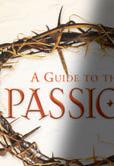Marked by Faith

Interesting things you might not know about





■ By Paul Gray
Pope Benedict XVI has confirmed to Sydney Auxiliary Bishop Anthony Fisher that he intends to visit Australia for World Youth Day in 2008.
Bishop Fisher, who has been placed in charge of the Australian arrangements for World Youth Day, said in an interview with the well-known Vatican correspondent John R. Allen that he saw the Pope earlier this month.
The bishop spoke to the Pope during an audience for members of the Pontifical Academy for Life, when Benedict told him he was looking forward to coming to Australia.
A
not yet available in
“When I introduced myself I said I was from Australia, and he said ‘I am coming to Australia’ and that he was looking forward to it,” Bishop Fisher said. “The Vatican has also written to say he’s coming,” he added. World Youth Day will be held in Sydney in July 2008.
Pope Benedict will be 81 that year. He has never flown as far as Australia at any time in his life, Bishop Fisher said.
Bishop Fisher also said that World Youth Day would be a unique event in Australian history, challenging the prevailing atmosphere of Australian secularisim.
“Australian secularism is often premised on an underlying Christian heritage of which people are often not conscious,” the Bishop said.
may well revolutionise the way we think about the Church and history, says Record correspondent PAUL GRAY.

“There’s also a secularism which is more dogmatic and intolerant, that puts up with religion as long as it stays at home, like a pussycat that sits in one’s lap and doesn’t cause any trouble.
“The young people who will be at World Youth Day will challenge the stereotypes of ‘religious youth.’ The event will confront secularism, not with the aggression of the rioting we’ve seen around the world against the Danish cartoons, but in a way that will convert hearts and get people to be more open to new possibilities.
“They’ll see young people happy, not heading to the pubs and getting into brawls after football, but helping each other and loving God. That will challenge secularism far more effectively.”


By
Sylvia DefendiLittle-known and highly specialised Perth school, St Clare’s, is looking for women to mentor their at-risk female students by providing them with a trusting relationship beyond designated school hours.
The Government-funded program, coordinated by Anne Butorac, will establish an opportunity for the students of St Clare’s to experience a satisfying, caring and supportive relationship.
“We are really trying to offer these young women the big sister, mother or grandmother figure, they may be lacking,” said Mrs Butorac.
St Clare’s, in Lathlain, provides an alternative, supportive school setting to ensure that girls aged 12-18, who are at-risk, have every opportunity to be successful in their secondary schooling.
“For most of these girls school is often the safest place. It would be really nice for them to begin feeling that way out of school as well,” said school Principal Sr Geraldine Mitchell RGS.
With 12 of the 30 young women enrolled at St Clare’s expressing an interest in the mentoring program, Mrs Butorac believes it is only a matter of time until more students realise the benefits of a program such as this.
“These girls come to St Clare’s from all over the metropolitan area, which means they often find it hard to keep in touch with their friends outside school hours,” said Sr Geraldine, adding that the program would be a means through which students could connect with the wider community.
“Mentors will find that it is quite a flexible opportunity; all that we are really looking for is consistency, commitment and a genuine interest in forming a relationship with one of the girls,” commented Mrs Butorac.
Mrs Butorac said the program would be of great benefit to mentors who were preparing to work
with youth, by providing them with the opportunity to develop their skill base for future employment in the field.
“The demand for a school such as this has remained constant – what has changed is the intensity of needs from students,” said Sr Geraldine. Said Mrs Butorac: “the girls really need someone they can trust.”
The historic beauty of Byzantine Christian icons is on display at Gallery 23 in Fremantle, through the creations of traditional iconographer Ana Poznanovic.
Depicting the portraits and actions of Saints, warriors and the Deity, the exhibition provides an insight into the history of the Church and the timelessness of this art form.
“An icon is like a silent protector. Icons created in the traditional method, of egg tempera on specially-prepared wood, can offer peace and protection for centuries without decaying,” said Ms Poznanovic.
A refugee from the wartorn Croatia of the 1990s, Mrs Poznanovic’s own story is one of discovering peace in times of hardship.
“It was during the war that I grap-

pled with deep sadness. Nothing could relieve it and give me peace until I entered the Church of St
Mark’s in Belgrade. It was there, in front of the Icon of St Michael the Archangel that I immediately felt

intense peace. “Since then iconography has been a large part of my life,” she said. Having exhibited at UWA’s Lawrence Williams Gallery and at the Fremantle Art Centre, Mrs Poznanovic is ecstatic to be sharing her talent through her first solo exhibition.
“Icons have given me so much indescribable peace. I hope that this exhibition can act as a medium through which I can share some of that peace and love with others.”
“When I create an icon, time stops.
“It is a feeling, not something that can be planned, calculated, timed or set – it just happens. Iconography is not a job, it is an expression of love and the passion I have for this art form,” commented Mrs Poznanovic.
The exhibition can be viewed at 23 Adelaide St (shop 1) in Fremantle; from Tuesday to Saturday 9am to 5pm, and on Sundays from 12 noon to 5pm, until March 31.
According to some experts, the key to marital happiness today is equal sharing of paid work and domestic chores.
But a University of Virginia study has found that the single most important factor for most wives was their husband’s emotional engagement.
W. Bradford Wilcox and Steven Nock found that women whose husbands earn the lion’s share of income, who don’t work outside the home, or who share a commitment to lifelong marriage with their husbands report the highest levels of marital happiness.
Those who reported that the division of housework was fair (rather than equal) were happier than those women who thought their husbands don’t do their fair share. The study, What’s Love Got to do With It? Equality, Commitment and Women’s Marital Quality, draws on the National Survey of Families and Households, which sampled more than 5000 couples around the US.
A related (unpublished) study by Wilcox found that even women who in theory support equal contributions of paid and unpaid work by both spouses, are happier in their marriages when their husbands are the main earners and when they do not work outside the home - so long as their husband is affectionate and understanding.
The research has been criticised for depending on data from 1992-1994, but Wilcox says data from 1994 to 2004 show the same pattern. “A big part of the story is motherhood,” he says.
PRODUCTION MANAGER DEREK BOYLEN production@therecord.com.au

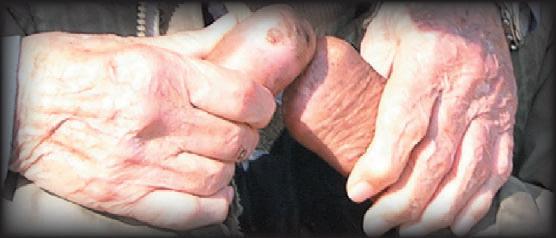
“Married mothers with children in the home get the biggest marital happiness boost from being at home. Married women who do not have kids in the home do not get much of a boost.” - FamilyNet e-zine




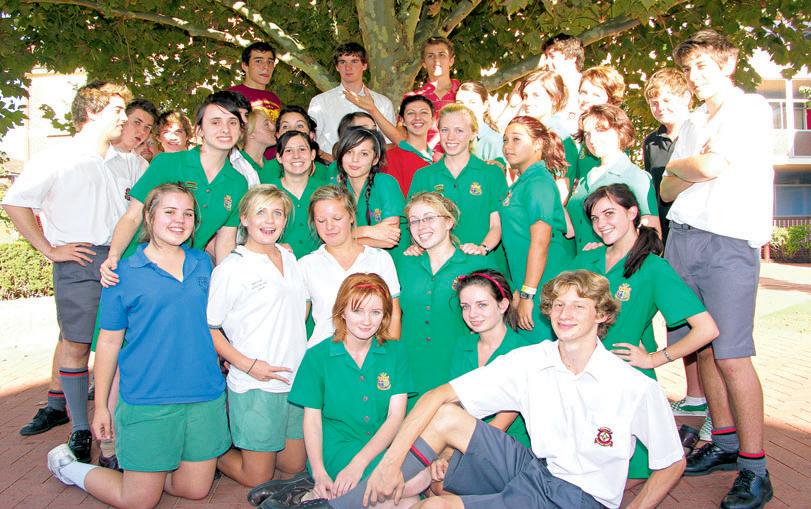 ■ By Sylvia Defendi
■ By Sylvia Defendi
Inspiring, biblical theatre piece, Plain Song, will be performed a week before Easter, at Mercedes College, as part of the College’s 160th anniversary celebrations.
Mercedes Head of Drama, Mrs Rosalind Jennings, said the Year 12 cast from Mercedes and Aquinas College are thrilled to be approaching the formal production on April 1.
“Beginning from creation and ending at judgement day, the play manages to cover the entire biblical history of our faith. It has done a lot for the 35 students involved, as I’m sure it will do for those who attend the production,” said Mrs Jennings.
Originating from the 14th century, the play has a rich Christian history, which was recently adapted by playwright David Britton in 1998. “David’s version still maintains all
the key messages and stories of the bible. He has very cleverly introduced a rather Australian context and made each story all that more relevant and contemporary,” said Mrs Jennings.
Boasting an intriguing production, the play moves actors, settings and audience across the campus in order to physically relive the journey of faith.
Mrs Jennings said it was a privilege to be the first school in Australia to have received the rights to perform such a historical piece.
“There are times in our lives when we may take our Christianity for granted. This production emphasises the humanity, reality and current relevance of our faith - a perfect production in the lead to Easter,” said Mrs Jennings. Plain Song will be performed at Mercedes College, at 7pm on April 1 and 2, and then again from April 4-7. To book tickets call: 9323 1323
Archbishop Hickey will lead celebration of the Day of the Unborn Child at St Mary’s Cathedral on March 25 - the Feast of the Annunciation.
Mass will be celebrated at 10am with the opportunity to offer an hour of adoration, in honour of the sacredness of human life, afterward.
Gail Instance, Director of Family Life International Australia said The Day of the Unborn Child commemorated the day that Jesus
Christ was conceived in the womb of His Holy Mother.
“On behalf of all pro-lifers, we congratulate and thank mothers who love and nurture their unborn children, and we commend the fathers who love and protect both mother and child.
It will be a day of prayer especially for those families who so generously defend life under difficult circumstances,” said Mrs Instance.
Mrs Instance said it would also be a day to offer hope and healing for the men and women whose children were killed by abortion.
An initiative of the Australian Jesuit Province, Ignatian Volunteers Australia (IVA), will be conducting its first information session for Perth at Holy Rosary Parish Centre, in Nedlands on April 1 from 2-4pm.
The initiative offers women and men, who may be retired or able to volunteer some time each week, the opportunity to aid those in the community who are living a life of poverty.
National Coordinator John Jennings said, “There are many in our community who struggle and
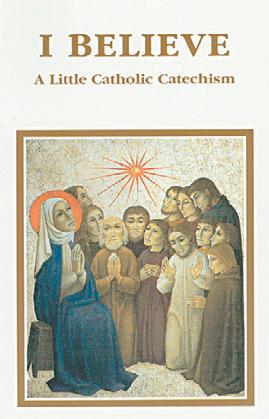
Since 1998 the little catechism “I Believe” has served religious, catechists, families and young adults as an aid to learning and teaching the Faith.
This new edition, revised in collaborationwith the Vatican’s Congregation of the Clergy, is a great help for all those who want to better understand the basics of the Catholic Faith and who are looking for a clear guide for their journey with and towards God.
Over 3 million copies distributed worldwide
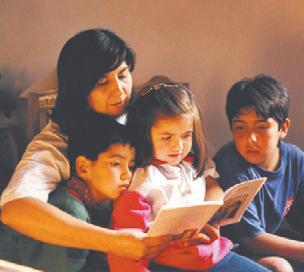
The new edition follows still more clearly the structure of the Catechism of the Catholic Church, with numerous references to it.
The language of the text is simple and accessible to all.
The first part of the book is based upon the Apostles Creed.
Each article of the Creed is explained in a separate chapter and beautifully illustrated with examples from the Bible. The second part is devoted to the Sacraments, the life of Jesus, prayer in the Christian life and an explanation of the Lord’s Prayer.
Beautifully illustrated throughout Just $10.00 a copy
A beautiful hand made olive wood rosary made by needy Christian families in Bethlehem will be sent to all those who give an additional charity donation of $12 or more to help support the Christians in the Holy Land*. Please tick the box below if you would like to receive the Rosary from the Holy Land.

need our assistance. IVA is seeking people who desire to deepen their lives by helping others as a volunteer.”
As the former Jesuit Father General Pedro Arrupe SJ said, “We need to be men and women for others.”
“People interested in learning more about IVA are especially invited and are most welcome to attend the information session,” said Mr Jennings.
Further information about IVA can be obtained from www.volunteers.jesuit.org.au or by contacting the National Coordinator though the website.
Profits from the World Cup, to be played in Germany from June 9 to July 9, can be expected to bring a smile to many German faces, but authorities are not leaving it to chance. The Cup organising committee and the German Tourist Board have launched a campaign aimed at “sensitising the population to their role as hosts”
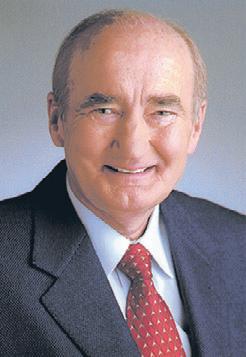
and dispelling the stereotype that Germans are too serious, obsessively disciplined and pretty much rude to foreigners. The charm offensive started with 20,000 posters that went up around the country this week and a television advertisement showing smiling Germans from all walks of life rolling out red carpets under the slogan, “A time to meet friends.” Significantly, the launch was held at Berlin’s stylish Adlon
Hotel, “a place in which friendliness is exaggerated to the point of embarrassment”, according to DW News.
A tourism advisor says the aim is not perfection, but to surprise and delight the visitors: “Somebody’s experience of a country is not based on one incident, but on ten small ones. So we have to surprise people. They do not think that Germans can do that.”
- FamilyNet e-zineDo I guarantee that when people come to do business with me, they will be treated with courtesy, sincerity, professionalism and ef ciency?
I say “I want your business and I m prepared to pay for it” and “I stand behind every car I sell”. Is that really true?
Is it true that I have over 40 technicians who are dedicated to getting my used cars in rst class condition before sale?
Is it true that every year for the last 17 consecutive years
I ve been Australia s top selling Hyundai dealer?
Is it true that if somebody buys a used car from me, I will pay for a pre-purchase RAC or similar inspection?
I have a warehouse selling cars under $10,000. Is it true that I offer a full money back guarantee within one week?
One of Australia’s most distinguished Catholic doctors has written a volume of memoirs aimed at boosting appreciation for family life. The book, The Education of Dr Joe by Joseph Santamaria, is based on memories of growing up in one of the country’s most famous Catholic families. The book was launched last week by Melbourne Archbishop Denis Hart, who said it highlighted “the irreplaceable role of family.”
Dr Joseph Santamaria, who is a member of the Pontifical Academy for Life, a former personal physician to Pope John Paul II and the founder of Melbourne’s St Vincent’s Bioethics Centre, said at the book’s launch that despite the hardships of his family’s early years, he remembers always feeling that he had grown up in a good counry.
This he attributed to the fact that family life was strong in his own home and neighbourhood at the time. Dr Santamaria emphasised the importance of the love he and his siblings experienced from his two migrant parents.
Dr Santamaria said that while his parents may have received little formal schooling, they were extremely

accomplished on what he called “normative education.”
“Normative education is the process by which values and virtues, your attitude to society, your personal development and identity and self-esteem, are conveyed and learned, against a background of parental love,” Dr Santamaria said.
“I have learned that the most important medium for this kind of education is the family, based on marriage.
“When I recall my Brunswick parents and neighbours from those early years, I have to give them five pluses for their performance in normative education.”
Archbishop Hart said Dr Santamaria’s book, which recalls the Santamaria family’s early years as members of the Catholic community in the working-class Melbourne suburb of Brunswick during the Depression and World War II, is “an encouragement and
Government-appointed nun’s radical view on Catholics and Muslims
■ By Paul GrayA Dominican nun chosen to represent Australia at an Asian interfaith conference believes “fundamentalism” is a problem in the Christian churches, as well as in Islam.
Foreign Affairs Minister
Alexander Downer appointed Sr Trish Madigan as a member of an interfaith delegation travelling from Australia for the second Dialogue on Regional Interfaith Cooperation for Peace, Development and Human Dignity, held in the Philippines during the past week.
Cardinal George Pell was also a member of the delegation, along with representatives of Australian Buddhist, Jewish, Islamic and Protestant communities.
In a lengthy essay in the theological journal Compass, Sr Madigan compared post-Vatican II “Catholic fundamentalism” with the problem of fundamentalism in the Islamic world. Both forms of “fundamentalism” reflect an unwillingness to
come to grips with the more tolerant, liberal atmosphere of contemporary Western society, Sr Madigan suggested.
Fundamentalists, of both the Christian and Muslim variety, must overcome their fear of the modern world if they wish their religions to be effective, Sr Madigan wrote.
“The real danger for the religious traditions of both Islam and Christianity is that if they are unable to interact in a positive and productive way with new cultural, social and political realities they will have nothing of worth to offer to the future of a developing and evolving world.”
According to the Compass essay, Sr Madigan sees a problem in the fears of Catholic conservatives unhappy with the changes in church life brought about by Vatican II.
“Catholic fundamentalism,” she writes, “gained momentum in the context of the doctrinal chaos and challenge to ecclesial authority which occurred throughout the Catholic community in the years following the Second Vatican Council (1962-5) and the promulgation of Paul VI’s encyclical Humanae Vitae in 1968.”
Catholic fundamentalism, she said, “tends to uphold the centuries immediately before Vatican II as its
reference point and ‘golden age’.”
Distinguished by a “legalistic orientation” and strongly influenced by the Council of Trent and the writings of St Thomas Aquinas, Catholic fundamentalism “is a protest against the modern blurring of Catholic identity and the loss of Catholic hegemony in the social, cultural and political arenas of the twentieth and twenty-first century,” Sr Madigan writes. An older form of Christian fundamentalism is that coming from Protestant America, where fundamentalists unhappy with the dissolution of the traditional family have long been unwilling to allow women a full role in society.
Like Islamic fundamentalism, which today threatens the Islamic world, Catholic and other Christian forms of fundamentalism are also a threat, though “mainly to the Christian tradition itself,” Sr Madigan writes.
While Christian and Catholic fundamentalism reflect unhappiness over changes in the Church and Western society, Islamic fundamentalism has different causes.
It is closely linked with anger at Western domination of Islamic nations over many centuries and the unfair treatment of Muslims by the West, Sr Madigan suggests.
More than half of all faculty in higher education in the US say it is important that undergraduates develop moral character and enhance their self-understanding, a new survey shows. Few colleges, however, actually tackle this task and the survey, conducted among 421 institutions by a team at the University of California at Los Angeles, indicates why: moral
education involves spiritual values, and most professors run shy of such discussions.
Less than a third of professors in the survey said colleges should facilitate a student’s spiritual development, while a similar survey of students found nearly half wanted them to do so. Oddly enough, a majority of faculty believe their own spirituality has a role to play
on campus, and 3 in 5 consider themselves to be religious people. Yet a big majority of students say their professors never encourage discussions of spirituality or religion or provide opportunities to discuss the meaning or purpose of life. The survey is part of an ongoing project at UCLA’s Higher Education Research Institute.
- FamilyNet E-zinebook as being written first and foremost to entertain his children and grandchildren.
Though he had not originally intended it for publication, he says he aimed “to arouse the sense in each individual reader that it is not a good idea to take yourself too seriously.”
He also recommended to anyone contemplating publishing their memoirs to leave it till very late in life. “That way if your life is foreshortened as a result of what you have revealed, you don’t lose too many years,” he joked.
a reminder of what family can achieve.” Archbishop Hart praised the contribution of families like the Santamarias to the muchtalked about multiculturalism of Australian society. “This story tells of people doing, 60 years ago, what we talk about now - people from many different cultural backgrounds sharing what they had and working, despite their differences, to build up society.”
Dr Santamaria described his
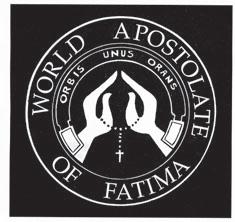
Present at the book launch were a number of parliamentarians including Family First Senator Steve Fielding, and well-known members of the Australian Catholic community, including Endeavour Forum founder Babette Francis, and football coach John Kennedy. The launch was held in St Joseph’s Parish Hall, where Dr Santamaria and his siblings grew up.
The Education of Dr Joe is also part of the centenary celebrations of the Santamaria family’s residence in Australia. Dr Santamaria is the brother of the late BA Santamaria, founder of the National Civic Council. The Education of Dr Joe is published by Connor Court Publishing.
presents a Lenten Renewal Program
Six recorded sermons by Fr J Corapi on Our Lady of Fatima will be screened at The Catholic Pastoral Centre in Harold St, Highgate, over three Monday nights, march 27, April 3, and April 10. Father’s talks get to the heart of the Fatima message and explain how to live the message, with a severe warning if we refuse to act. The talks begin at 7.30pm each evening. For bookings call 9339 2614.

Centacare Employment and Training is an agency of the Roman Catholic Archbishop of Perth that provides services to the unemployed in the areas of finding employment, further education or vocational skills training.
Currently, the organisation is continuing with its plan to recruit an additional two board members during 2006, following the recent retirement of two long serving members.
Individuals with skills and expertise in any of the following areas – Organisational Development, Business Management, Human Resource Management, Process Improvement, Legal, Business Planning or Public Relations and who are committed to the principles of social justice, are invited to apply.
Early morning Board meetings are held once per month and last for two hours. Further information on the organisation is available at www.centacarewa.com.au
Expressions of Interest kits are available by emailing probertson@centacarewa.com.au or by phoning Pauline Robertson, Executive Director on 9482 7001.
Expressions of Interest should be sent to probertson@centacarewa.com.au or posted to Pauline Robertson, Executive Director, Centacare Employment and Training, 3rd Floor, 641 Wellington Street, Perth WA 6000
Afarmer, an accountant, a pharmacist, a student and an airline steward – these are just some of the faces among the eight new seminarians for 2006 at St Charles Seminary in Guildford.
Seminary rector Fr Don Hughes OMI told The Record he was delighted with the intake after a week of orientation activities concluded on Friday February 24.
Classes began the following
Monday as students settled into the regular life of the seminary, which includes lectures at both St Charles and Notre Dame University in Fremantle.
The eight new seminarians range from 24 to 50 years of age and, if all decide that the priesthood is where they are being called, will spend seven years preparing for ordination and the life of being a parish priest.
A total of 21 students plus one deacon are now based at St Charles.
Deacon Hong Pham is due to be ordained to the priesthood on May 12.
Anyone interested in pursuing the possibility that they might be called to the priesthood can contact Fr Armando on 9470 9113 or Fr Hughes at the seminary on 9279 1310.

Composer Fr Chris Willcock SJ has taken up the post of 2006 Chair of Jesuit Studies at UWA and Notre Dame.
He will be resident at St Thomas More College until the end of the first semester in June.
Fr Chris said that his main academic work would be with the School of Music at UWA, with the emphasis on composition. He would conduct composers workshops and forums as well as teaching and helping student com-
posers. A concert would be arranged featuring his own and student compositions. Other Australian composers visiting WA would be invited to join the work. His major public function at Notre Dame would be to deliver the Peter Slattery Lecture on June 7. The lecture commemorates the contribution of Fr Peter Slattery, a Carmelite priest, in the early days of the university before his sudden death as a relatively young man. The topic will be: “Everyday bless-
ings; the heart’s song, the Church’s praise.” Fr Willcock will also participate in a May 27 liturgical symposium being organised by Gabrielle Mercer, the organist and liturgical coordinator at New Norcia. He has been asked to compose the Agnus Dei for the occasion to go with his earlier Sanctus which the Monks now use. He will also work with the Archdiocesan Director of Liturgy, Sr Kerry Willison RSM, and the local liturgical musicians network in projects still to be finalised.
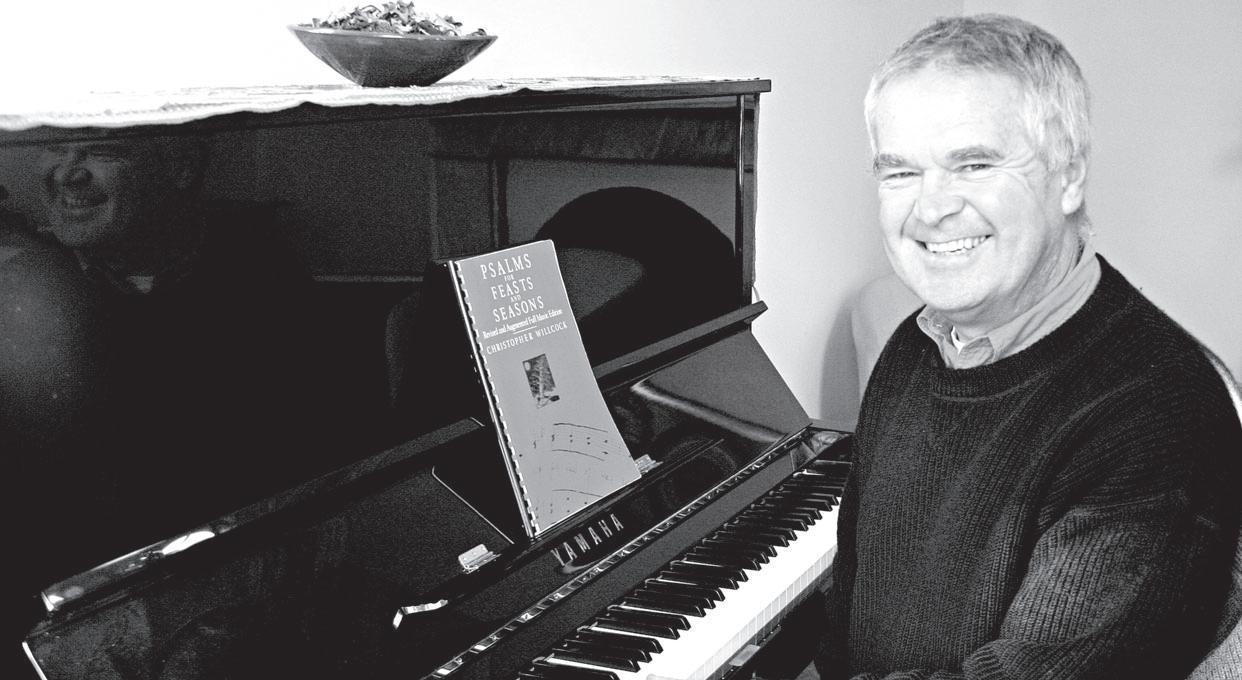
Join Pope Benedict XVI in prayer - March
General intention: “That young people who are searching for the sense of life may be understood, respected and accompanied with patience and love.” Mission intention: “That, throughout the Church, there may grow that shared missionary awareness, which favors the collaboration and exchange of those who work in the missions.”
Once upon a time you could call someone skilled in the manipulative use of words a logodaedalus. The archaic word for what is known today as a spin doctor can be found in the new edition of the Chambers Dictionary (due for release in Britain in August) along with zoozoo (wood pigeon), jobernowl (blockhead), incompossible (incapable of co-existing), supernaculum (to the last drop), and other relics of our ancestors’ English usage.
Published in Scotland, the dictionary is favoured by puzzlers, writers and language-lovers for its pithy approach, such as defining “eclair” as a cake long in shape but short in duration.
- FamilyNet e-zine
St Munchin’s Catholic School is a double stream co-educational parish school of Our Lady of the Most Blessed Sacrament, Gosnells.
The school was established in 1953 by the Sisters of Mercy and enjoys excellent facilities for both staff and students.
The school has a special emphasis on Literacy and Numeracy development as well as Information and Communication Technology. Early intervention programs have been established which are coordinated by support teachers and a specialist teacher is employed to teach Information and Communication Technology. Other specialist areas include Physical Education, Music, Library and LOTE (Italian).
The school community works together to provide pastoral care for each person and to nurture the development of the whole child.
The School Board and Parents & Friends’ Association are actively involved in the school and its educational programs.
Applicants need to be practising Catholics and experienced educators committed to the objectives and ethos of Catholic education. They will have the requisite theological, educational, pastoral and administrative competencies together with an appropriate four-year minimum tertiary qualification and will have completed Accreditation for Leadership of the Religious Education Area and Accreditation to Teach Religious Education or its equivalent.
A current Federal Police Clearance/100 Point Identification
Check must also be included. The appropriate Police Clearance
Consent form is available from the Department of Education and Training website www.eddept.wa.edu.au/teaching/ downloads/policeclearance.pdf
The official application form, Referee Assessment forms and instructions can be accessed on the Catholic Education Office website www.ceo.wa.edu.au Enquiries regarding the position should be directed to Helen Brennan, Consultant, Leadership Team on 9212 9268 or email sch.personnel@ceo.wa.edu.au
All applications, on the official form, should reach The Director, Catholic Education Office of WA, PO Box 198, Leederville 6903 no later than 23 March 2006.


May I, with respect, respond to Fr John Hill’s attack on me in last week’s Record in reply to my earlier letter in which I criticised the use of the terminology ‘BCE’ and ‘CE’ in place of ‘BC’ and ‘AD’ in the parish bulletins published by the Redemptorists.
I claimed that this was an example (albeit unintentional on the writer’s part) of ‘Christophobia’ – a word coined by the Jewish scholar J. H. H. Weiler to describe the contemporary elimination of Christianity from modern life.
To justify the use of the new terms Father Hill cites the journal, Biblica, published by the Pontifical Biblical Institute - not ‘Commission’ as Fr Hill wrongly states. The new dating terminology, he says, is used “in a number of the articles” therein.
Fr Hill seems to infer from this that the new terminology has the Vatican’s imprimatur. But this is not necessarily so.
For a start, the Institute does not speak for the Magisterium, and its journal, Biblica, is merely a journal of research and opinion. The
Institute (unlike a Commission) is solely an advisory body whose advice may or may not be taken.
Secondly, Biblica states clearly in each issue that the Directors do not accept responsibility for the opinions expressed by their contributors. Furthermore, editorial advice to prospective contributors makes no mention of a preferred dating terminology: clearly it is a matter of the contributor’s preference.
Thirdly, a check on articles published in recent issues shows that the use of the standard dating terminology, BC and AD, is common, while the new terminology is less common and difficult to find. If we follow Fr Hill’s logic, and Biblica is cited as an authority for the use of BCE and CE in which they occur occasionally, then should not the same authority be cited to validate the older terminology BC and AD which appear more frequently?
If we are looking for authority we can do no better than quote the opening words of John Paul ll’s encyclical, Redemptoris Hominis, “Jesus Christ is the centre of the universe and of history....”
But of course citing Biblica is a red herring beside the point I was making in my first letter. A progressive group calling itself The Religious Tolerance Organisation based in Toronto (and listing some peculiar sponsors on the internet), is actively engaged in promoting BCE and CE on the grounds that “it is less offensive” and is “less likely to cause pain to people of other religions”.
Where is the evidence for this? Distress and pain are more likely to be the lot of Catholics at Mass when they read the notes and see another example of ‘Christophobia’.
If the new terminology is justified in certain instances (and this I don’t accept) surely it is far from acceptable in a publication aimed exclusively at a Catholic readership at Mass on Sundays.
Finally, Fr Hill’s criticism of The Record for publishing my letter as ‘an error of judgement’ is quite unjust. However critical the writer may be of my original letter, the BCE and CE dating controversy is an important issue for all Catholics and any Catholic paper doing its job would open its correspondence pages to a debate on the matter.
Tony Evans East FremantleCongratulations, Jamie O’Brien, for reporting on the Alpha launch and the reminder from our Archdiocesan representative Carol Wright that the invitation to do the Alpha program is for everyone. As she pointed out, it’s a way of actually doing something about the Pope’s directive, it’s an evangelising opportunity in a relaxed environment, it promotes an ecumenical togetherness and it promotes joy and enthusiasm... a good all-round recipe that most of our Catholic parishes need.
Harry Mithen JoondannaIrefer to your editorial in your edition of March 2, 2006.
I am aghast that an editorial of the Catholic mouthpiece of the Church
in WA, two thirds of a page, could be devoted to such trivial, controversial, party political matters! It gives a clear message of political bias and is certain to upset some of differing political allegiances. All too often the political, not moral, personal opinions of the editor and some other contributors to the Record are evident. It reflects badly on the Church, and does antagonise some readers. A Catholic newspaper should only deal with political issues where serious moral matters are at stake, and should NEVER give the impression of political bias.
An apology would not be out of place, and certainly this should not be allowed to happen again.
There is plenty of good material available, praise be to God, albeit much of it from overseas, and it would be preferable to skip an editorial from time to time !
Daniel Regnard Perth“Go Tell Everyone”, the Bishops letter on the media, (The Record February 23) points out, among other things, the dangers of the internet and the increasing acceptance of offensive (immoral?) television programs and movies. In addition, it challenges our apathy in monitoring what our children are watching, or complaining about a program.This is an issue which is of increasing concern, particularly for parents and grandparents.
Some of us may be unsure of just how to go about putting in a complaint about a particular program, movie, or even the lyrics of a song.
Media Standards Australia can provide help in this area. They can be contacted on (08) 9448 7774.
Gillian Gonzalez WillettonTony Evans and The Record should be congratulated for seeking to discuss the derivation of Before Common Era as a replacement for the time honoured BC.
We have never been given the basis for this switch. What Common Era are we referring to? If it is the birth of Jesus then why suppress the fact? I first struck the term in 1974 in Beijing and took it to be part and parcel of the anti-Christian attitude of the regime. Chinese also do not celebrate Christmas or Easter. Are we to follow suit?
The Jewish and Muslim communities have not chosen this switch unlike the Buddhists who measure the years from the birth of Buddha about 500 years before Christ.
They both could have begun with Abraham or the Muslims since the birth of Mahomet 700 years after Jesus. They did not do so presumably because they accepted the calendar devised by Christian Rome which begins with the birth of Christ. In Roman times events were dated from the foundation of Rome in about 700BC.
Maybe both abbreviations should be used to make clear the Common Era began with the birth of Jesus. In Western Countries we should not give up another aspect of our Judeo-Christian Heritage.
John Barich Claremont


Fasting, almsgiving and, above all, prayer help us develop a spiritual ‘game plan,’ not just for the Lenten season but for all of our days.
■ By Mike AquilinaHow do you know it is Lent? It’s not so much by the ash mark on your forehead or fish icons on the calendar.
Tradition tells us that Lent has three distinguishing marks: prayer, fasting and almsgiving.
Prayer is surely the most important, because it’s the one that unites them all. Fasting and almsgiving are themselves just forms of prayer.
There are two classic definitions of prayer. The one in most catechisms comes from St John of Damascus (eighth century): “Prayer is the raising of the mind and heart to God.” The other comes from Clement of Alexandria (third century). He defined prayer as “conversation with God.”
In prayer we talk to God, and he talks to us. As in any relationship, this conversation takes many forms. Think of all the ways a husband and wife communicate: formal marriage vows, casual chat, winks across a crowded room, affectionate caresses and phrases they never tire of repeating.
Our communication with God includes a similar range of expressions, set phrases, quiet conversation, gestures such as the Sign of the Cross and the intimate embrace of the sacraments.
Just as a man and woman grow in love by repeating “I love you”, so we Christians grow in love by repeating the Church’s prayers.
Endless dialogue
Prayer comes in many forms and styles. These are usually divided into “vocal and mental” prayer. The categories are helpful, but not watertight. All prayer, after all, should involve our mind; so, in a sense, all prayer is mental prayer. Modern writers sometimes speak of the two types as formal prayer and spontaneous prayer.
Such distinctions are useful, but we should step beyond them for a moment. When we look at all prayer as conversation, it can change the way we go about it.
Thinking of prayer as conversation can help us also to overcome obsta-
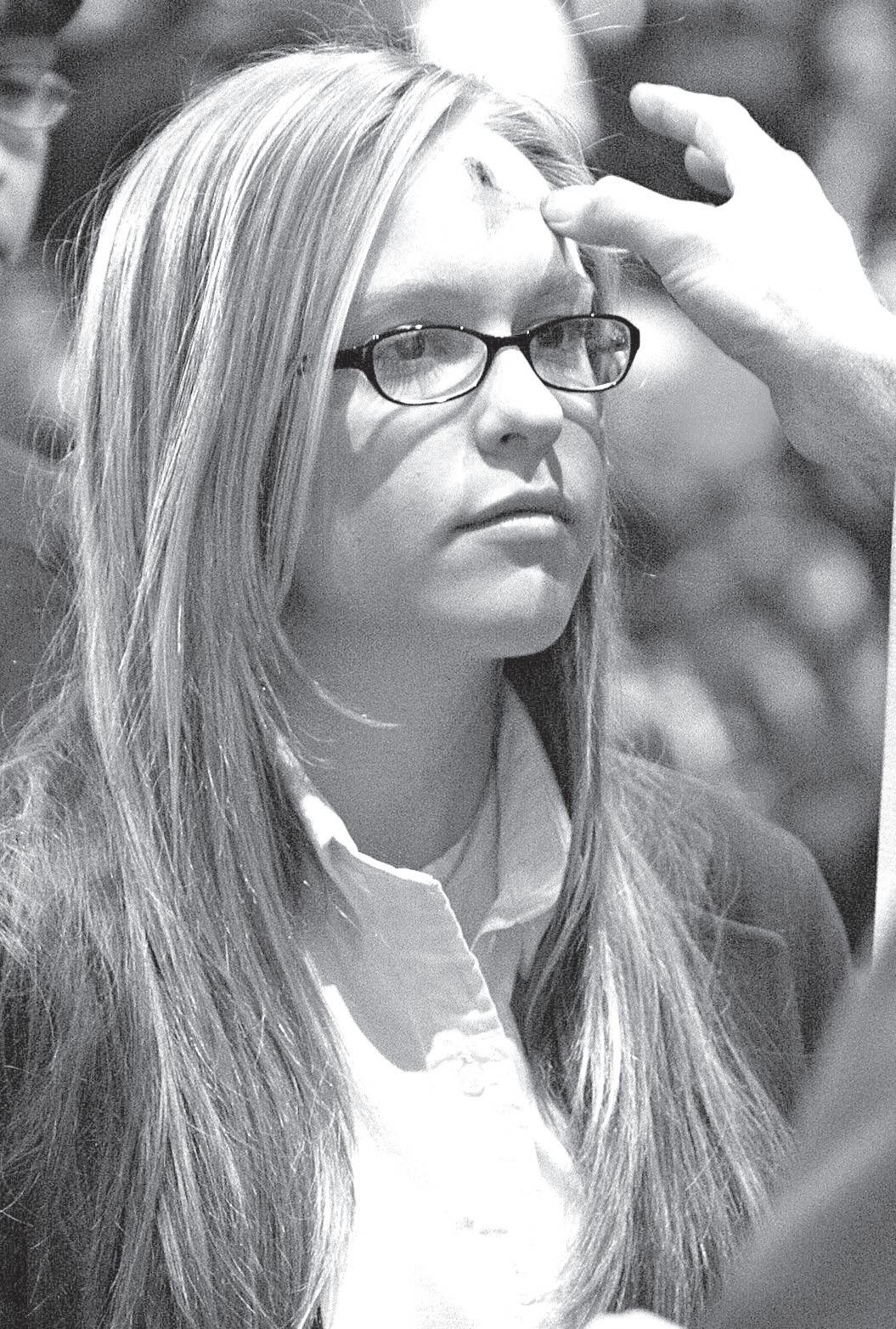
cles such as distractions, dryness and inability to focus because all these things also come up in human conversation.
Prayer is a conversation that never ends. In the Scriptures, St. Paul says: “Pray at all times” (Eph 6:18); . “Pray without ceasing” (1 Thes 5:1);
and “be constant in prayer” (Rom 12:12). He saw prayer as endless conversation.
That seems to be asking a lot, but it’s really the best way to think about it. If we are to pray this way, we have to form the habit of prayer. And, like any good habit or skill,
prayer requires a sustained effort, over time, with much repetition.
Many people bristle when they hear about discipline in prayer. They think prayer should always
be spontaneous. And sometimes prayer does come spontaneously, as when we experience some great joy or great sorrow. But spontaneity is most often the fruit of discipline. It is usually the best-trained musicians who are able to improvise freely. To do anything well takes time, dedication and patient endurance through sometimes tedious exercises.
The most effective way to discipline our prayer life is by following a program, a schedule of sorts what Cardinal Joseph Bernardin called “a game plan for the Christian.” The best time to set up such a plan is during Lent. .
A “plan of life” is a firm but flexible program that schedules our prayer amid the ordinary duties of work, family life and social activity.
A daily plan should include some vocal prayers, such as the Rosary or other devotions; plus reading of the Bible and some spiritual book (the writings of the saints are best); attendance at Mass (at least on Sundays and holy days, but more often if possible); and quiet time for more focused conversation with God in mental prayer. The best place for this prayer is in church, before Jesus in the tabernacle.
“Prayer first means God is speaking to us and not the other way around,” said Father Kenneth Myers, chaplain to Pittsburgh’s Latin Mass Community and Beaver Valley Medical Centre. “That requires silence, the art of listening carefully to the Lord. And the best place to do that is in the presence of the Blessed Sacrament. Prayer before the Blessed Sacrament requires real effort and commitment, but even when our hearts are dry and it seems fruitless to keep on praying, being before the Eucharistic Lord is like being in the sunlight even by doing nothing we still absorb those powerful rays of light.
Our plan should also include weekly or monthly practices, such as confession, fasting, almsgiving and so on.
It helps to set standard times, or to key each practice to other activities, so that we never forget. We can keep our spiritual book by the coffee pot and read while the java is brewing every morning. We can use the beginnling of our lunch hour as a reminder to say the Angelus. We can pray the Rosary while waiting for the bus home in the evening. We can listen to 10 minutes of the Bible on tape as we drive.
We should plant prayers throughout the day like vines.
Put one here, one there and pretty soon, like ivy on a wall, our prayer will cover our day. Continued over

Continued from Vista 1
Follow Jesus’ way
This is how Jesus modeled prayer for us. His own prayer life was rich and varied. Sometimes he offered formal prayers (Mk 12:29, 15:34). He kept holy days, made pilgrimages and attended the rich liturgy of the Jews (Jn 10-14). He also prayed spontaneously (Jn 11:41-42). He made time to pray alone in silence (Lk 3:21-22). Yet he also prayed together with his friends (Lk 9: 18). He fasted, and he studied the Scriptures.
The first Christians followed their Lord in all these practices, and so do we.
Not that it’s always easy to do.
But the formal quality of prayer helps us know what to do when we meet with obstacles.
“Never, never, never, never give up!” said Steve Galvanek. A systems analyst, husband and father, Galvanek says his plan sustains him even when he’s tired and preoccupied.
“If in my feeble attempts to say a Rosary, I manage just one or two heartfelt Hail Marys, that’s far better than if I hadn’t tried at all.”
Even the more unpleasant and difficult things in life can become reminders to pray. The key is to think of them as opportunities rather than obstacles.
Sarah Scott admitted that it’s hard to find time to pray. She’s a mother of five, owner of a home-based business and volunteer at her children’s Catholic primary school. “It helps to offer everything up all the little things that you don’t like to do, she said. “I hate folding laundry. But,
instead of getting annoyed about it, I try to offer it up and think about what other people have to put up with. Efforts like this keep me talking with God throughout the day.” Sounds like a plan.
Thank you, dear God, for all the things that you have given me: family, food, clothing and home. You have given me health, a mind and free will. Best of all, dear God, you have given me the gift of true faith. Help me to share with others the love you give me. Amen

Fasting: Self-denial prepares a path to our heavenly Father. It allows us to overcome our attachments to possessions.
Why do Catholics have to fast?”
The question came from a nonCatholic boy in our Scouts group. We had spent a long soggy weekend in the middle of the bush. And now, on Sunday morning, the adults announced that breakfast would be delayed so that the Catholics could keep the Communion fast. He was not a happy camper. His question comes to mind again during Lent, because fasting is the most distinguishing practice of the season.
On two days in Lent, Ash Wednesday and Good Friday, Catholics around the world limit
their eating to one meatless meal.
On all the Fridays of Lent we abstain from meat.
Why do we fast? Our reasons find firm grounding in the Bible.
When we fast, we follow holy example. Moses and Elijah fasted 40 days before going into God’s presence (Ex 34:28, 1 Kgs 19:8). Anna the Prophetess fasted to prepare herself for the coming of the Messiah (Lk 2:37). They all wanted to see God, and they considered fasting a basic prerequisite. We, too, wish to enter God’s presence, so we fast. Jesus fasted (Mt 4:2). And since he needed no purification, he surely did this only to set an example for us. In fact, he assumed that all Christians would follow his example. “When you fast;’ he said, “do not look gloomy like the hypocrites. They neglect their appearance, so that they may appear to others to be fasting” (Mt 6:16). Note he did not say, “If you fast,” but “when’. And when is now. In Lent the Church extends the idea of fasting, beyond the minimal skipping of meals, to a more far-reaching program of self-denial. Jesus said: “If any man would come after me, let him deny himself ... daily” (Lk 9:23). So we “give up” something that we’d ordinarily enjoy: sweets, beer, a favorite TV show or the snooze alarm.
Nourishment for soul
Fasting has its health benefits, but it’s not the same as dieting. Fasting is something spiritual and far more positive. Fasting is a spiritual feast. It does for the soul what food does for the body.
The Bible spells out specific spiritual benefits of fasting. It produces humility (Ps 69:10). It shows our sorrow for our sins (1 Sm 7:6). It clears a path to God (Dn 9:3). It is a means of discerning God’s will (Ezr 8:21) and a powerful method of prayer (8:23). It’s a mark of true conversion (Jl 2:12). Fasting helps us to be detached from the things of this world. We fast, not because earthly things are evil, but precisely because they’re good. They’re God’s gifts to us. But they’re so good that we sometimes prefer the gifts to the Giver. We
During the season of Lent, make sure you are choosing alternatives to meat that are healthy for you and the environment.
Many types of seafood come from waters that are overfished or are caught or farmed in ways that harm
Here are some options recommended by the Record:
● Barramundi (farmed in Albany).
● Cod: Rankin (Kimberly)
practise self-indulgence rather than self-denial. We tend to eat and drink to the point where we forget God. Such indulgence is really a form of idolatry. It’s what St Paul meant when he said, “their god is the belly ... with minds set on earthly things” (Phil 3:19).
How can we enjoy God’s gifts without forgetting the Giver?
Fasting is a good way to start. The body wants more than it needs, so we should give it less than it wants.
St John of the Cross said that we cannot rise up to God if we are bound to the things of this world. So, we give up good things, and gradually we grow less dependent on them, less needy.
Heavenly preparation
All of this is part of our preparation for heaven. We are destined to lose our earthly goods anyway.
Time, age, illness and “doctor’s orders” can take away our taste for chocolate, our ability to enjoy a cold beer and even the intimate embrace of a loved one. If we have no discipline over our desires, then these losses will leave us bitter and estranged from God. But if we follow Jesus in self-denial, we’ll find a more habitual consolation in the ultimate good, God himself.
How is it that some people are able to remain serene and cheerful amid extreme suffering and even when facing imminent death? It’s not just a matter of temperament. They’ve prepared themselves for the moment by giving up the things of this world, one small thing at a time.
They’ve grown so accustomed to small sacrifices that the big one isn’t such a big ask.
No one says that fasting is easy.
In fact, says Benedictine Father Thomas Acklin, “Fasting can seem very hard, and it can seem that if I do not eat I will become weak and will not be able to work, or pray, or do anything.
“Yet, there is that marvellous moment,’ he adds, “when, after some hours have passed, my stomach has stopped growling and I’ve even forgotten what I’ve given up, when there is a lightness, a freedom, a clarity of the senses and a brightness of attitude and feeling,


we give are symbolic of the greater giving that defines the Christian life.
Of the three marks of Lent prayer, fasting and almsgiving - almsgiving is surely the most neglected. And yet, in the only place where the Bible brings all three together, the inspired author puts the emphasis firmly on the last: “Prayer and fasting are good, but better than either is almsgiving accompanied by righteousness.”
“It is better to give alms than to store up gold; for almsgiving saves one from death and expiates every sin. Those who regularly give alms shall enjoy a full life” (Tb 12:8-9). Why is almsgiving better than prayer and fasting? Because it is prayer, and it involves fasting. Almsgiving is a form of prayer because it is “giving to God” and not mere philanthropy. It is a form of fasting because it demands sacrificial giving - not just giving something, but giving up something, giving till it hurts.
“You must know that what you deny yourselves in fasting, you must give to heaven in the poor.” - St Ambrose
on charitable giving in a Catholic newspaper,” he said.
“And it had a lot of testimonies to the fruits of tithing. Breadwinners told how God provided whenever they were in need or had an emergency. I decided, then and there, to start tithing, and I’ve been doing it ever since.”
“The giving of alms should be free from anxiety and full of joy! His gain will be greatest when he keeps back least for himself.”
- Pope St Leo the Great For Kenna, those 65 years have had their financial ups and downs. He served in the army during World War II, went to university and raised a family of nine children. Through it all, he said, he was often tempted, but he never wavered in his tithing.
“There were many times when I reached a point where I said, ‘Something has to give but I’m not going to give up on my tithing’.”
It’s a matter of trusting God, Kenna added, “and God will not be outdone in generosity?’
Jesus said, “It is more blessed to give than receive” (Acts 20:35 ), but those who tithe often find themselves on the receiving end as well.
central air-conditioning, electric lights, consistently safe food and water, antibiotics and even aspirin - these are luxuries beyond the dreams of our ancient ancestors. We are living high, but are we giving high? . . .
It’s a good question to ask ourselves during Lent. It is a scandal, after all, for Christians to have closets overstuffed with clothing when there are families who are shivering because they can’t pay their electricity or gas bills.
It is a scandal for Christians to be epidemically overweight when they have near neighbours who go to bed hungry.
Generous to the end
We need to give to God whom we meet in our neighbour until these problems go away.
Whatever we give, whether it’s a tenth or a twentieth or half, is symbolic of the greater giving that defines the Christian life.
As God gave himself entirely to us, so we give ourselves entirely to Him.
In the Eucharist, he holds nothing back.
He gives us His Body, Blood, Soul and Divinity - everything He has. That’s the giving we need to imitate.
Lent, Catholic Mission.
But, whenever possible, our charity should also involve personal acts, not just automatic withdrawals from our bank account.
When he was alive Pope John Paul II asked us to see, and be seen by, “the human face of poverty.” We give what we have till we have nothing left to give.
Regis Flaherty, editor in chief of Emmaus Road Publishing, a USbased company, remembers his sister Pat as a woman who practised giving all her life, to her siblings, her husband, her children and her friends.
“ I ask you one thing: Do not tire of giving, but do not give your leftovers. Give until it hurts, until you feel the pain.”
- Blessed Teresa of Calcutta
To the end, she gave what she could.
“When she was dying she was in and out of consciousness, but whenever she looked up at us, she would invariably smile - absolutely amazing considering how much she was suffering.”
● Crab: Blue Swimmer (caught - Peel/Harvey Estuary & Shark Bay)
● Dhufish: WA (Pilbara)
● Lobster (harvestedShark Bay to Cape Leeuwin).
● Mussels (farmed - Albany)
● Oysters (farmed - Albany)
● Prawns: King, Tiger and Bannana (Exmouth & Shark Bay)
● Red Emperor (Pilbara)
● Salmon: Australian
(caught - Albany)
● Sardines (Fremantle)
● Snapper: Red and WA (Canarvon)
● Trout: Rainbow (farmed - Albany)
● Tuna: Bigeye and Yellowfin (caught - Fremantle to Canarvon)
● Whiting (caught - Esperance)
● Yabby (farmed - Albany)
For more information, visit www.wafic.com.au
an incomparable closeness to the Lord.”
Small sacrifices
Lent is a special season, but God wants these 40 days to have a lasting effect on our lives. So, in a sense, fasting is for always.
Father Rene Schatteman, an Opus Dei chaplain, said that he received this lesson directly from a canonised saint. “I learned from St Josemaria Escriva, whom had the privilege of knowing personally, that it’s good for a person to try to make some small sacrifice at each meal, always, and not just during Lent.”
Father Schatteman emphasised the importance of little things, and the big effect they can have: “We should all want to help Christ redeem the world by practising selfdenial in everyday, ordinary eating and drinking to take a bit less, or a bit less of what we like most, to avoid eating between meals, to skip a snack or dessert, etc., without making a big thing out of it.”
One person, who requested anonymity, shared his longtime practice of fasting on Fridays, “a 12-15 hour fast from food - water only.” He said, however, that this can be difficult to carry out, not because of the hunger, but because it can disrupt family life.
“It’s very hard to sit at the family table and not eat. It’s not so much a question of resisting the temptation of the food. I always felt like I
was ‘breaking ranks’ with the rest of the family. My fasting actually felt selfish, like I was taking something away from our time together as a family.”
Recently, he said, he’s modifying his fast, “to be broken at the family dinner in the evening. “
Why do Catholics fast? As the source above put it: “It’s medicine for my biggest problem - selfishness and lack of selfcontrol. To force myself to curb my appetites, to not satisfy my desires even for a short period of time, this is a good thing. To offer up the little sacrifice to God, for my family, for people who are hungry through no choice of their own, this I think is also good.”

Almsgiving: Tithing may be painful, but it leads to spiritural riches. Whatever gifts
Jesus presented almsgiving as a necessary part of Christian life: “When you give alms, sound no trumpet before you, as the hypocrites do in the synagogues and in the streets, that they may be praised by men. Truly, I say to you, they have received their reward. But when you give alms, do not let your left hand know what your right hand is doing” (Mt 6:2-3). He does not say if you give alms, but when. Like fasting and prayer, almsgiving is non-negotiable.
The first Christians knew this.
“There was no needy person among them, for those who owned property or houses would sell them, bring the proceeds of the sale, and put them at the feet of the apostles, and they were distributed to each according to need” (Acts 4:34-35).
That was the living embodiment of a basic principle of Catholic social teaching, what tradition calls “the universal destination of goods.”
The Catechism puts it succinctly: “The goods of creation are destined for the entire human race” (No. 2452).
But they can’t get there unless we put them there and that requires effort.
As with prayer and fasting, so with almsgiving. If we have a plan, we’ll find it easier to do. Throughout history, many Christians have used the Old Testament practice of “tithing” as a guide - that is, they give a tenth of their income ‘to God.’
In practice, that means giving it to the poor, the parish or to charitable institutions. Ed Kenna remembers the day he decided to start tithing. “When I was in high school, back in 1939-40, I read an article
“I worked as an industrial engineer through the highs and lows of industry,” Kenna recalls. “Twice my job fell victim to corporate mergers, but the phone always rang just in time. I never lost an hour of work to firings or redundancies.”
He sees the difficult times as God’s test of our trust.
“It’s especially hard in the beginning. On your first payday, it hurts. On the second, the pain’s a little less. At about the third or fourth, there’s no pain at all.You get used to it. It’s a habit. But you have to make that firm resolution: I’m going to do it and not give in.”
More than just money
Kenna, like many others, interprets tithing to mean taking 10 per cent off the “first fruits” gross income, rather than net. He divides this up as “5 per cent to the parish and 5 per cent to other Catholic institutions.” He also gives of his time and has, for many decades, been a volunteer for the St Vincent de Paul Society.
Indeed, many Catholics extend the concept of almsgiving beyond money to include time and talent as well, donating a portion of these to worthy causes.
In the late fourth century, St John Chrysostom looked at the good life people were living in the imperial court, and he was filled with righteous anger. In the name of God, he raged against those who owned toilet seats made of gold, while other people starved in cold hovels. While our toilets may be made of less precious materials, many Australians today enjoy a better standard of life than any Byzantine emperor ever knew. Central heat,
Charity begins at home, where we daily make the choice to give our time, our attention, our affirming smile, and give generously.
But charity must not stop there, because for Catholics “home” is universal, and our family is as big as the world. We need to dig deep and give much where much is needed - Caritas, for example, or, outside
Sometimes all we can give is a smile, but sometimes that is the greatest sacrifice, the greatest prayer, and indeed the most generous and most sacrificial alms.
BRIAN STEPHENS from the Archdiocesan Planned Giving Office is available to speak to parishes and organisations on sacrificial giving. He can be contacted on (08) 9422 7924 or pgo@highgate-perthcatholic.org.au
● “The Stations of the Cross With Pope John Paul II,” By Joseph M. Champlin ($5.95).
● “St Joseph’s Books for Children – Lent,” By Catholic Books Publishing Company ($3.95).
● “St Joseph’s Books for Children – Stations of the Cross,” ($3.95).
● “Bread and Wine – Readings for Lent and Easter,” By Henri Nouwen ($24.95).
● “On the Road to resurrection – Daily Reflections for Lent,” By Jack McArdle ($19.95).
● “The Way of the Cross – CD,” By Marilla Ness ($26.95).
● “Easter Colouring Book,” By Catholic Books Publishing Company ($3.95).
● “The Story of Easter,” By Christopher Doyle and John Haysom ($21.95).
● “The Dolorous Passion of Our Lord Jesus Christ,” By Anne C. Emmerick ($27.95).
● “Songs and Praise for Lent and Easter –CD,” By A.Barr ($26.95).
● “Journey of Faith for Teens – Lent,” Published by Liguori ($3.95).
● “Lenten Prayers for Busy People,” By L. J. O’malley ($28.95).
● “Lent Begins at Home,” By P.R. Ryan ($8.95).
-Information supplied by Catholics Corner, Canning Vale, 9456 1777.
● “The Passion,” Directed by Mel Gibson (approx. $25).
● “Lenten Reflections with Pope John Paul II,” By Max Polack (Can be obtained through The Record for $23.50 including postage.

A new Vatican document aimed at Gypsies is just as applicable to those who hunger for love
■ With John Heard
The Vatican recently released Guidelines for the Pastoral Care of Gypsies which turns out to be an obscure but thrilling document.
Why? It demonstrates Catholicism as love: a religion that causes otherwise selfish men and women to reach out to difference with charity.
The document states that:
“For centuries [the Roma, Sinti peoples, et al] have lived in traditionally Christian countries, but they have often been marginalised. Marked by suffering, discrimination and often also by persecution, they have nevertheless not been forsaken by God “who wills everyone to be
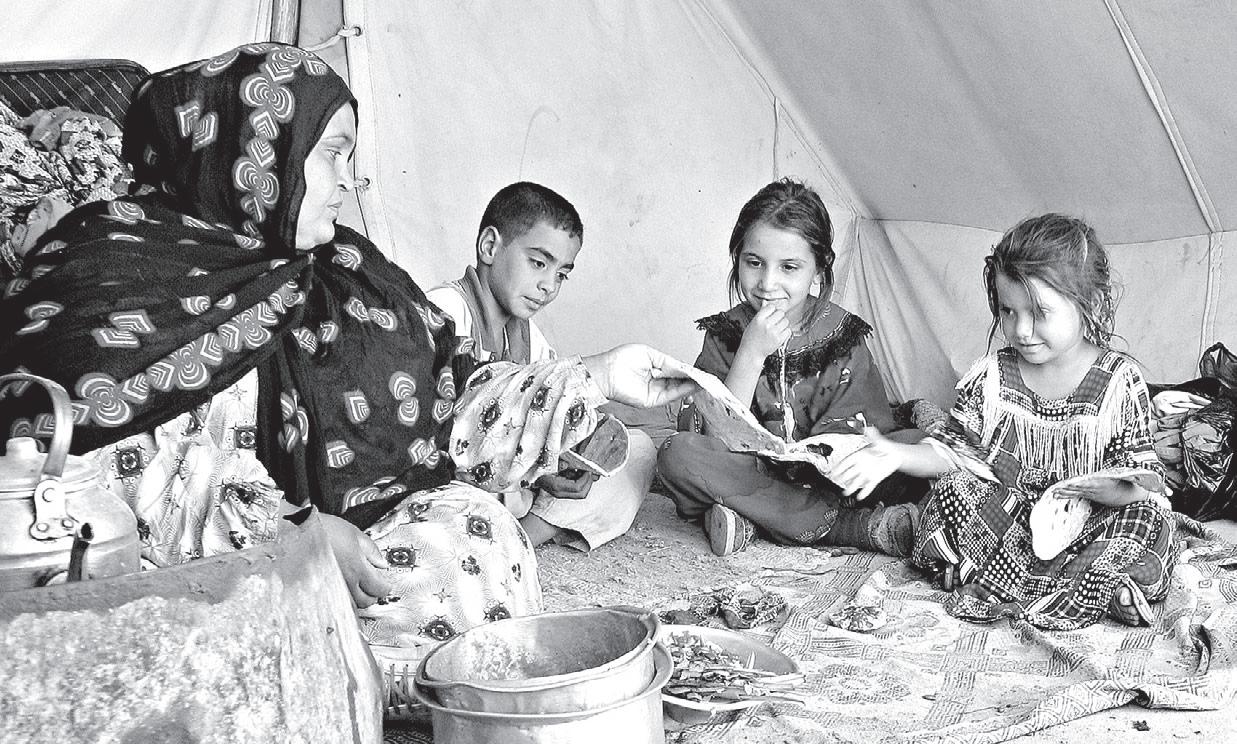
saved and to come to knowledge of the truth” (1 Tim 2:4).”
Throughout, the Vatican makes a concerted effort to indicate that it is interested in Gypsies and wants to draw them deeper into the Church.
While there aren’t many Gypsies in Perth or wider Australia, however, there are other sorts of people who suffer collective loneliness and neglect. People with an aboriginal heritage and the poor are the most obvious examples. The Church stands alongside such people but
others may be left behind. Indeed, despite a series of high-level documents dealing with same-sex attraction, for the most part, same-sex attracted individuals aren’t usually specifically targeted by priests or movements.
That must be fixed.
Another passage from the document teaches:
“A genuine encounter between the Gospel and Gypsy culture cannot, however, indiscriminately legitimise every aspect of the latter.”
Therefore, a purifying encounter between the Gospel and ‘gay culture’ is, it seems, long overdue. It can and must be carried out by heroic priests and lay-people who, sure in their sexuality and open to the rich currents of Catholic aesthetics and Christian thought, stand ready to counter anti-Christian nonsense with the love of Christ. Lives can be changed, souls saved, if only we’re brave enough to carry the truth to our brothers and sisters.
Of course, some people in some places have tried this before, but their efforts have been marred by Catholic ‘lite’ and fuzzy liberal ideas.
As the Vatican makes clear, love doesn’t have to always mean blind acceptance. Sometimes love means pointing out error.
Similarly, the difficult issues that cycle around transsexualism cry out for moral clarity. Certainly the individuals so afflicted are often outcasts, craving loving attention.
They’re in dire need of the truth about human sexuality and gender, a truth that Catholicism alone can provide.
Beneath the nonsense that too often characterises ‘gay culture’ there are living, breathing individuals. Surely such individuals, surely homosexuals, just like the Gypsies, demand an appropriately loving response from each of us.
As the Vatican document concludes:
“...in his Apostolic Letter Novo Millennio Ineunte Pope John Paul II invites us to “promote a spirituality of communion”, which above all means sharing other people’s joy and suffering, sensing their wishes and taking care of everyone’s needs, so as to offer everyone a true and deep friendship.”
It’s time a love-bolt, fired straight from the best of our religion, hit the ‘gay culture’ hard.
John Heard lives in Melbourne, and has lived with same-sex attraction for a number of years. He is a lawyer and a practising Catholic.
 ■ With Derek Boylen
■ With Derek Boylen
God doesn’t judge successful parenting the way that most people do. In the next life God won’t ask whether our children achieved financial independence.
The career path they choose or the size of their share portfolio won’t mean much to him. He won’t be concerned about their academic prowess.
Whether our children achieve a university qualification isn’t high up on his list of priorities.
But God will care if our children have become good persons. He will care if they are the type of people who help the poor and lonely.
He will care if they are people of faith. He will care if their life is guided by gospel values and the beatitudes.
God will care if they try to live life abundantly and help and inspire others to do the same.
And God will care if we, as parents, have had a part in helping our children to mature into adults who do this. That’s part of our call, our vocation. Don’t get me wrong, care for our children’s achievements at school and their future ability to become financially independent and to provide for a family are important parenting concerns.
We have a responsibility to ensure that our children will be able to survive in the kind of society we live in.
But we are confronted with these concerns daily, through report cards, homework that needs doing and decisions about which university course to enrol in.
Unfortunately, we are not often confronted with the daily needs of our children’s spiritual growth.
Lent is a time when we are challenged to be concerned with our personal relationship with God and others.
We are called to growth through prayer, fasting and almsgiving. As parents we are also called, at this time, to a renewed effort in helping our children to grow in their relationship with God and others.
One of the ways that Karen and I are doing this during Lent is by encouraging our children to give to Project Compassion.
However, for parents, encouraging true almsgiving is more than just telling our children to put some money in a box.
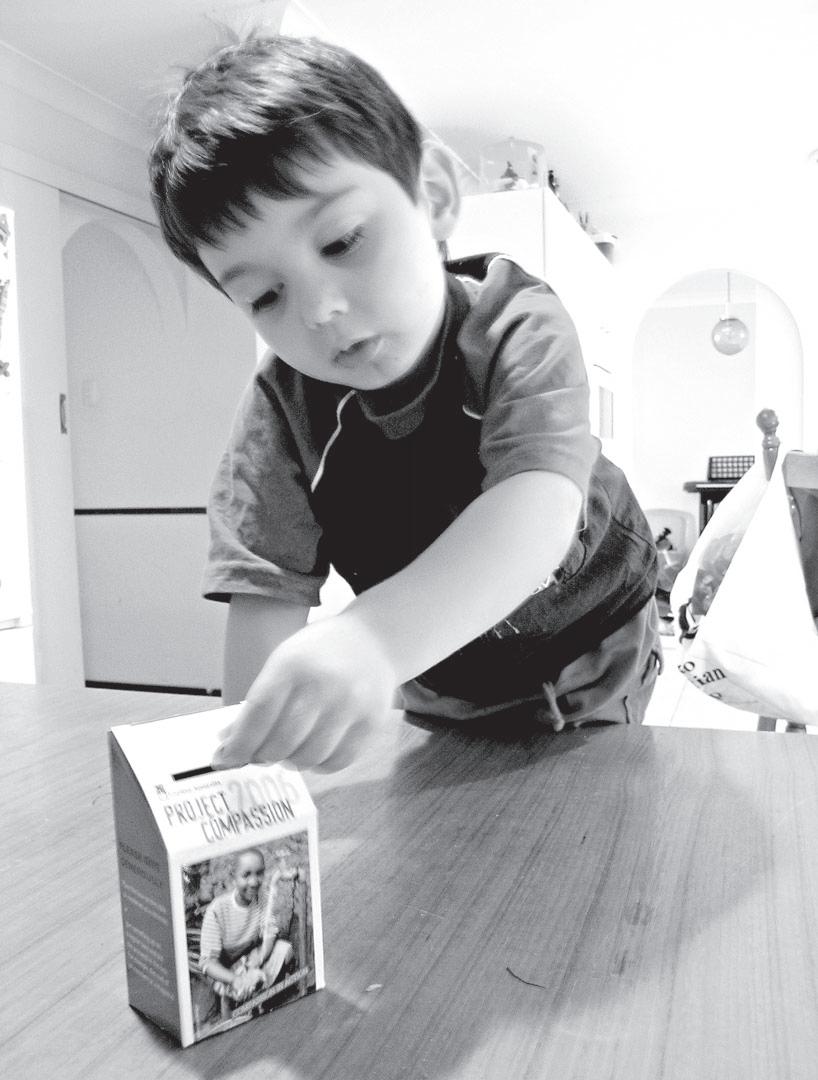
True almsgiving calls for a change of heart. As parents it is a challenge to help our children develop a real
heart for those in need in the world. Besides telling our children simply to put money in a box we should
help them empathise with those the money is helping. This Lent I encourage you to make it a family project to get to know, in a personal way, the lives of some of those people who are helped by Caritas.
Take the time, with your children, to find out what life is like in a place like Tanzania. How do people in villages live? How do parents try to provide for their children?
What is daily life like for a child there? What are their educational prospects like? Get on the internet and search for pictures that tell the stories of their lives.
Take time this Lent as a family to get to know intimately what life is like for a person living in a specific part of the developing world.
Almsgiving is more than simply a nice thing to do. It connects us in a special way to our less fortunate brothers and sisters in Christ.
Lent is a time when we as parents should be encouraged to think about our children’s faith development. What kind of person are they becoming?
Are they developing a heart for those without?
Perhaps we should be a little less concerned about what will appear on their report card this term and a little more concerned about what will appear on our heavenly report card under PARENTING in the next life.
However well-intentioned it may have been, Catherine Parish’s column ‘Ethics are fine – but virtues are important too’ (The Record, March 2 2006) contains far too many errors to pass without correction.
For the sake of brevity, I will comment on only three errors of fact.
Firstly, Mrs Parish seems to believe that there is only one kind of behaviour which our society should class as ‘good or bad’, that this behaviour is somehow ‘immutable’ - presumably meaning that every right-thinking person would do exactly the same thing - and that ethics is only ‘a system of moral principles by which human actions and proposals may be judged good or bad or right or wrong’ (a definition lifted verbatim from the Concise Macquarie Dictionary).But on the practical level ethical behav-
iour is neither as simple nor as immutable as that.
There are multiple systems of values in our society, reflecting (for example) different professions, religions, and cultures, so it is only natural that there will be many different and sometimes conflicting decisions made in the name of good ethics.
To accept this is realism, not moral relativism. The challenge for us is not simply to decry the existence of alternative systems, but to give living witness to the fact that Christian ethical behaviour is not only practical but also, ultimately, preferable.
Secondly, Mrs Parish claims that “what is generally accepted as ‘ethics’ is really ‘situation ethics’ a much more dangerous thing.”
Situation ethics has no place in the authentic Catholic ethical tradition, but that doesn’t mean that faithful Catholics will necessarily make exactly the same moral choices every time.
Because, thirdly, Mrs Parish is wrong to assume that decisions made on the basis of immutable values and principles will necessarily lead to identical decisions in concrete cases.
A sound knowledge of the traditional theory of virtue would reveal that, as they are instantiated in individual persons, the moral virtues lead to particular behaviours which are far from immutable.
For what constitutes virtuous behaviour for one person at one time may be vicious behaviour at another time, or in other circumstances, or for another person.
Take for example the simple moral question: how much money should I give to Project Compassion?
If I were a rich person, to give only $10 to Project Compassion might be classed as ‘mean’ (a moral defect).
Another person giving $10 might be classed as ‘generous’ (a virtue) depending on their financial resources and their other financial responsibilities.
But a third person giving $10 might be classed as ‘profligate’ (a moral excess) if that meant that they could not meet another serious financial responsibility.
Insofar as authentic Christian ethics deals with virtue, we reflect the teaching of Aristotle and Thomas Aquinas that the virtuous person is one who knows exactly what to do (neither too much, nor too little), and then does it willingly and easily.
Such moral facility can and should be taught, and Mrs Parish is right to say that merely reading mission statements will not do the job.
Every person can become virtuous if they are helped to make good moral decisions consistently when they are young; so that when they are older they may recognise the good more easily and choose it more readily.
The virtues are anything but oldfashioned, as Mrs Parish rightly says, but neither are they as simplistic as she would have us believe.
Fr Joseph Parkinson Director L J Goody Bioethics CentreCaritas Australia is giving children in Bolivia the chance to be children. This basic human right has been robbed from many of them, who spend their days working to support their family’s daily food needs instead of playing and having fun.
Alex, seven-years-old, lives in a remote village in Bolivia called Chipiriri. His father, a subsistence farmer, often struggles to provide enough food for Alex and his twoyear-old brother. This forces Alex to take on adult responsibilities such as selling food on the street to earn money and looking after his younger brother.
In 2000, Caritas Australia began funding the Pujillay Project. This program is run by the Association of Non-Governmental Health Organisations (ASONGS) and aims to educate children (three years to 12 years) in basic first aid, hygiene, food production and the rights of children.
Caritas Australia is currently funding an extension of this program, targeting communities living in and around the city of Cochabamba.
Approximately 3000 children are currently involved in the Pujllay project which has now been implemented in 38 communities in Cochabamba and surrounding villages.
Twice a month, Alex, and other children in Chipiriri, participate in the Pujllay project. They are shown how to grow fruit and vegetables, they learn how to irrigate vegetable beds and they are taught how to treat diseases in the vegetables when these occur.
The children work together to
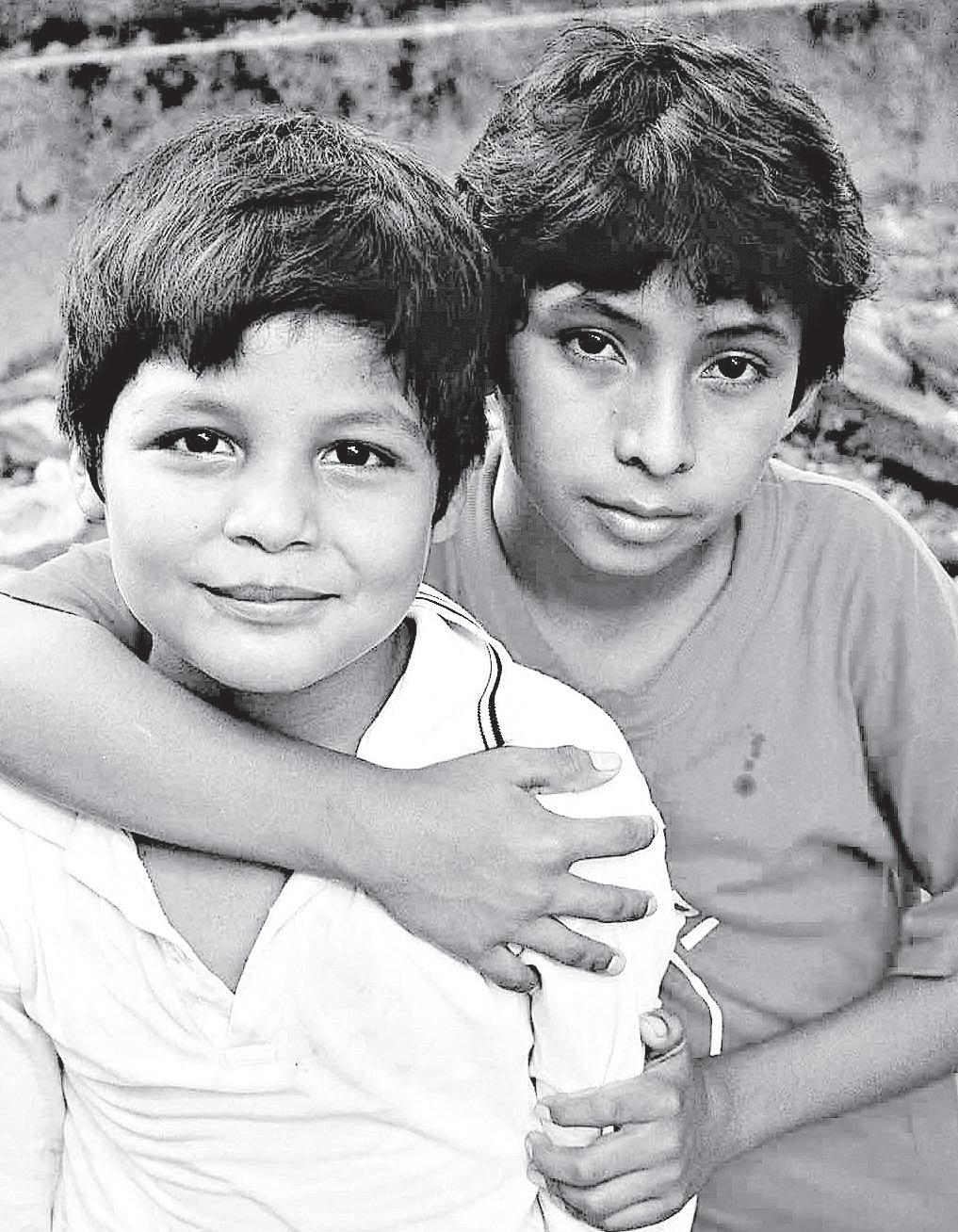
look after a community garden and then, using their skills, are given seeds to take home so that they can grow and maintain a similar style of garden of their own.
Alex now tends to his own vegetable garden at home which provides fresh fruit and vegetables for his family.
He also looks after two farmyard animals, having also been taught

Religion
in general - and Christianity in particular
- is crucial
to society. So I’ve argued for years. Now an American academic has unexpectedly trumped me.
■ By Paul GrayRodney Stark is his name. Stark’s new book, The Victory of Reason, is a 235-page showstopper which is not published in Australia yet, but which promises to revolutionise many of our contemporary political and moral debates.
And if it doesn’t do that, it’ll at least make a lot of people angry.
Western society in 2006 is fractious to the point of fisticuffs over matters of reason and religion. If you doubt this, take two hot debates: the death penalty cases in Indonesia and the parliamentary vote on RU 486. I believe that every human life is sacred from conception as a God-given matter of principle. Therefore RU 486 should have been banned, as legalising it will lead to the destruction of the sacred, quite apart from its effect on women’s health.
A sock on my jaw, anyone?
Now, since I also think that as every human life is sacred - even the nasty ones - the Australians convicted of drug-running in Indonesia must not be executed.
Anyone else like a go?
Of course, not everyone will share the Christian premise on which these arguments are based. But if Christianity is irrelevant, why should anyone get angry?
Which leads me back to The Victory of Reason by Rodney Stark. Stark’s book has angered many people in America - and looks set to do the same here - by proving that not just the health, but the very existence of civilisation depends on Christian faith.
Stark is no Bible-thumper. He’s a Baylor University professor of social sciences and Berkeley graduate whose earlier work charted, from secular data, how Christianity took over the Roman empire in pagan times - through superior values.
for centuries, Muslim Arab civilisation kept the flames of civilisation burning, while medieval Christian Europeans languished in the mud. Stark upends that belief.
Yes, he says, Islamic scholars kept ancient Greek and Roman learning alive - but their culture didn’t do anything progressive with it. It was the “ignorant” Westerners, steeped in Christian theology, who developed the power of reason and applied it to making the world a better place. Stark says the so-called “Dark Ages” of Europe are, in fact, a myth. The Dark Ages were actually bright. It was in this period that our modern ideas of the separation of church and state, non-hereditary and elected government, personal freedom, property rights and capitalism were born.
Stark lists some Christian inventions of these “Dark Ages” - from clocks and bells which tell the time, to deep-earth ploughs which created northern European agriculture, to effective cannons which transformed warfare.
European “round” ships, and compasses which could tell direction at sea, enabled international transport, communication and travel. Meanwhile Christian ideas about personal freedom and individual rights also caused the abolition of slavery, and the enshrining of property rights for the first time in Magna Carta - without which, Anglo capitalism could never have developed.
And it wasn’t the later Protestant Dutch and English who invented goodies like capitalism and representative government, either, Stark proves. It was the medieval Catholics of Venice, Genoa and other Italians city-states who did so, by electing their own town councils and pioneering modern manufacturing industries. Today Africans and Asians, including Chinese Communists, are converting to Christianity in vast numbers - not just for existential satisfaction, Stark says, but because of Christianity’s appeal to reason, and its inseparable link to the rise of the West.
“For many non-Europeans, becoming a Christian is intrinsic to becoming modern,” he says.
Stark ends his revolutionary volume with a recent quote from a Chinese scholar who concluded it was not military, political or economic causes, but rather a religious one, which explains the pre-eminence of the West throughout the world today.
breeding skills through the Pujllay project. This is providing even greater food security and nutrition for his family.
Your donation to Project Compassion will help children such as Alex and his brother. Donations can be made by phoning 1800 024 413, online at www.caritas.org.au or by post to GPO Box 9830 in your capital city.
“Christianity created Western Civilisation,” he authoritatively asserts. “Without a theology committed to reason, progress and moral equality, today the entire world would be about where nonEuropean societies were in, say, 1800: A world with many despots, lacking universities, banks, factories, eyeglasses, chimneys and pianos.” Christianity is such an obvious story of civilisational success that you wonder why so many refuse to believe it. As Stark says, rather than accepting the facts, many moderns prefer to think Christianity has contributed nothing to civilisation except intolerance.
Of course, it’s widely believed that
“The heart of your culture is your religion - Christianity. That is why the West is so powerful,” he wrote. Our society will remain a progressive and desirable place to live to the extent that it remains fundamentally Christian.
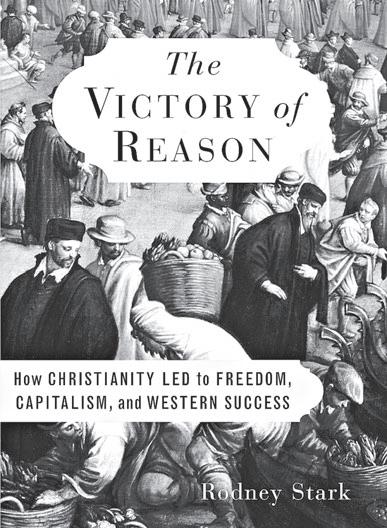


‘Jesus Decoded’ site launched to counter claims in ‘Da Vinci Code’
Anew Web site sponsored by the US bishops’ Catholic Communication Campaign has been established to provide accurate information about the life of Jesus, the origins of Christianity and Catholic teaching to counter claims made in the best-selling novel “The Da Vinci Code” by Dan Brown.
The Web site, www.jesusdecoded. com, was launched on March 9. A film version of the book is slated for nationwide release on May 19.
The site contains information that refutes claims made in the book about the nature of Jesus; his relationship with Mary Magdalene; the first four ecumenical councils of the early Church and how they shaped today’s teaching about Jesus; contemporaneous accounts of Jesus’ life that were not selected for the New Testament; the role of women in the church throughout history; and the “Last Supper” paintings by Leonardo da Vinci and other artists of his era. Also found on the site is a column by John Thavis, Rome Bureau chief for Catholic News Service, on the level of Vatican reaction to the book and forthcoming movie.
There is also an essay from the U.S. bishops’ Office for Film & Broadcasting on the marketing hype behind the movie; and a commentary, “What’s Wrong With ‘The Da Vinci Code’?”, written by Father John Wauck, a US priest of Opus Dei, the personal prelature which figures prominently in the novel.
The site also has production information on the CCC’s “Jesus
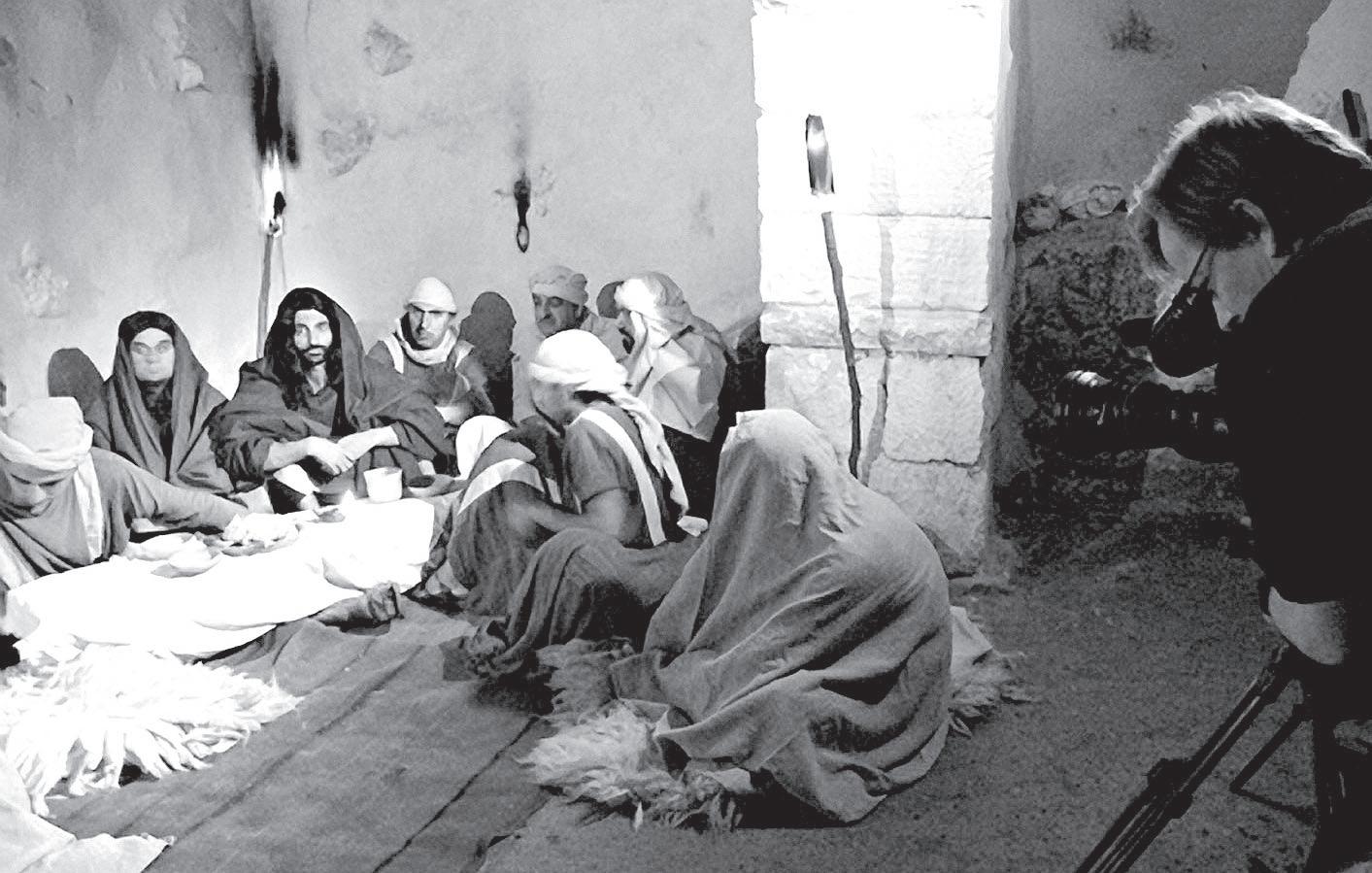
Decoded” TV special, including information on air dates and times in cities around the United States.
The program, shot on location in Israel, Turkey and Italy, includes interviews with international scholars versed in art, history and Scripture who “help separate Catholic truth from popular fiction.”
It has been offered to NBC affiliates, but each affiliate’s management
Catholic aid agencies in Britain and the United States say as many as 3.5 million Kenyans face a severe food emergency because of several seasons of drought.
The Catholic Agency for Overseas Development, an agency of the Bishops’ Conference of England and Wales, said millions of Kenyans could starve to death unless emergency food supplies are delivered soon.
Dominic Stolarow, a CAFOD humanitarian officer who has been visiting the worst-affected areas in the northeastern part of the country, said Kenya is also facing its most severe drought since 1971.
“Cattle die first in times of drought as they can only go for up to three days without water,” he said in a March 7 statement.
“In some villages I went into I saw carcasses just piled up,” he said.
“There is very little people can do once they have lost their livestock.”
The famine and drought have been caused by consecutive poor rainy seasons.
On March 10, CAFOD welcomed a UN announcement of a multimillion-dollar humanitarian crisis fund, although money was not immediately allocated for African food emergencies.
Catholic Relief Services, the US bishops’ international aid and development agency, said up to 11 million people in Kenya, Ethiopia, Sudan, Eritrea and Somalia have been affected by the lack of rain and resulting food shortage.
The UN World Food Program also has cited those figures.
James Morris, head of the World Food Program, said on March 6 that about 40 people had already died of malnutrition in northern Kenya and that many other deaths would follow unless $189 million of food aid could be secured.
Morris said UN stocks of corn, rice, beans and vegetable oil would last only until the end of March.
makes the decision whether to air it.
“Many of my students and myself included enjoy a good, fast-paced novel, and enjoyed ‘The Da Vinci Code’ on that level, as a tall tale of adventure,” said Alan Schreck, chairman of the theology department at the Franciscan University of Steubenville in Ohio, who contributed an essay to the Web site on early church ecumenical councils.
“There’s a level where this book is appealing to people,” Schreck told CNS.
“That is what makes it dangerous to someone, if they believe it’s a historical representation or an accurate theological presentation.”
Rather than cover up the truth about Jesus, as the novel suggests, the early church councils tried to uncover the truth, according to
Schreck. In those councils, the participants “asked critical questions and had entertained different views of who Jesus was, his mission, and in this process saw the need to clarify the truth about Jesus that sprang from the most authentic and reliable sources about him,” Schreck said. “And there were many sources about him that were being promulgated.” CNS
By
Barbara WatkinsThere’s a new line of comic books out, but the “superheroes” featured in each issue don’t have X-ray vision, super strength or the ability to fly.
Instead, they have a power most parents would much rather their children read about - faith.
“Stories of the Saints,” published monthly by Arcadius Press, is a four-book packet of comics, each featuring the life of a different saint.
“For example, a recent packet had St Francis of Assisi, St. Anthony of Padua, St Joan of Arc and St Elizabeth Ann Seton,” said Tony Sansone III, chief operating officer of Arcadius Press.
A subscription for the packets can be ordered online at www. arcadiuspress.com; packets are US$11.99 a month plus shipping.
Sansone, a member of a large, local St Louis Catholic family, is 22

years old, a member of Our Lady of the Pillar Parish and a student at Fontbonne University, where he is working on a bachelor’s degree.
“I’ve attended Catholic school my whole life,” Sansone told the St Louis Review, newspaper of the St Louis Archdiocese. “I have a passion for Catholic education.”
Arcadius Press, named after a saint of the early Church, is funded by a group of investors who Sansone said share that passion.
“We want to produce something for children through which they can learn about the lives of the saints - people who devoted them-
selves to Christ and the Catholic faith - in a medium that is fresh and exciting,” he said.
The comics are produced in colour and on slick paper. Each tells a simple story of a saint. A puzzle or game about the saint is included in the back of each book.
Each book has three or four artists, colorists, inkers, designers, someone who works with pencils and a writer, Sansone said.
The offices of Arcadius Press are in Springfield. Sansone said company representatives were told by personnel of the Diocese of Springfield-Cape Girardeau that the books do not require an imprimatur, or ecclesiastical approval, because they are not strictly intended for educational purposes.
“They are more for entertainment purposes,” Sansone said, although they are also educational.
“We also want to set up a fundraising project for parishes,” he said, through which parishes sell subscriptions to the monthly packets and receive a portion of the sales.
In an airy workshop on a top floor of Lima’s Museum of the Nation, art restoration experts touch up plump cherubs on a 450-year-old bas-relief altarpiece.
The workshop is the next to last stop on an odyssey that has seen the masterpiece smuggled out of a tiny chapel in the southern highlands of Peru and into the United States, where it was seized from an art dealer in Santa Fe, New Mexico.
Once some minor damage is repaired, the 12-foot-high altarpiece will be displayed briefly at the museum before being returned to the chapel in Challapampa, in the prelature of Juli in the southern highlands known as the Altiplano. The Challapampa case is part of a thriving international trade in stolen art works, particularly colonial religious art from the Andean countries of Peru, Bolivia and Ecuador. Few pieces are ever recovered, and the countries are losing valuable cultural and religious heritage, including pieces that have never been documented, said Maria Elena Cordoba, administrative manager of Peru’s National Institute of Culture.
“The trafficking is a major problem, not just in Peru but in all the countries,” Cordoba said. “There’s a large market that is economically powerful.”
The value of the lost art is impossible to estimate, partly because most of the works are priceless and irreplaceable and partly because no one knows the real scope of the problem.
“Peru has things it doesn’t even know exist,” Cordoba said.
Experts say that much of the trafficking is theft to order. Collectors in the US and

Europe, especially Italy, France and Spain, who are seeking particular pieces of art contact agents in Peru who may hire local people to steal the works.
The targets range from tiny pieces, such as the silver crown on a statue of Mary, to paintings or large pieces like the Challapampa bas-relief. Historian Mariana Mould de Pease, who has served on the Peruvian bishops’ Cultural Heritage Commission, recalled the theft of a mural painted on the wall of a church in the highland Diocese of Cuzco. The operation required a sophisticated, time-consuming transfer technique that had to have been done by an expert, she said.
Such cases highlight the complexity of the web of trafficking, in which buyers often purchase the silence and complicity of local residents or authorities along with the artwork.
“More than organised crime, I’d say it’s
organised corruption,” Mould de Pease said.
The corruption reaches into high places. In 2000, authorities raided the home of a Peruvian cultural attache in La Paz, Bolivia, where they found more than 100 pieces of religious art, much of which had been stolen from Peru, Cordoba said.
Colonial religious art graces the walls of hotels in Cuzco and private homes in Peru and the United States, and many people do not regard owning such works - which were almost certainly stolen from churches - as a crime, said Mould de Pease.
The owners often justify their purchases by arguing that the works were deteriorating in poorly protected churches where no one cared for them. “It’s very prestigious to say, ‘I saved it,’” Mould de Pease said. “Nevertheless, there are people who care for them, but they are poor people.” CNS
At the start of what may be a sweeping reform of the Roman Curia, Pope Benedict XVI merged the leadership of four of the Vatican’s councils under two presidents.
The Vatican announced on March 11 that French Cardinal Paul Poupard, head of the Pontifical Council for Culture, also would serve as the interim president of the Pontifical Council for Interreligious Dialogue and that Italian Cardinal Renato Martino, head of the Pontifical Council for Justice and Peace, temporarily would head the Pontifical Council for Migrants and Travellers.
The Vatican announced that the Pope accepted the retirement of
Catholic Charities of the Boston Archdiocese announced on March 10 that it will stop providing adoption services rather than continue to comply with a state law requiring no discrimination against gay and lesbian couples who seek to adopt. The same day Massachusetts Gov. Mitt Romney called it “a mistake for our laws to put the rights of adults over the needs of children” and said he would seek legislation allowing religious agencies to perform adoptions without violating their religious tenets. Prompted by a similar issue arising at Catholic Charities of San Francisco, a top Vatican official has said Catholic agencies should not be involved in adoptions by same-sex couples. “We have
the head of the migrants’ council, Japanese Cardinal Stephen Fumio Hamao, who turned 76 on March 9. To fill the vacancy, the Pope united “for the time being” the presidency of the office with that of justice and peace.
Cardinal Poupard’s assignment as president of the Pontifical Council for Interreligious Dialogue filled a post made vacant after the Pope on February 15 named its former head, Archbishop Michael Fitzgerald, to be the new ambassador to Egypt and
encountered a dilemma we cannot resolve,” said Father J. Bryan Hehir, Boston Catholic Charities president, and Jeffrey Kaneb, chairman of the board of trustees, in a joint statement on March 10.
They said the agency “cannot reconcile the teaching of the Church, which guides our work, and the statutes and regulations of the commonwealth,” under which archdiocesan adoptive services had placed 13 children with same-sex couples over the past 20 years.
The first obligation of every Christian is to share with others the love of God and his promise of salvation in Jesus Christ, Pope Benedict XVI said. The Pope met on March 11 with people from about 100 countries
praised more and criticised less by the Church.
Archbishop John Foley, president of the Pontifical Council for Social Communications, made that appeal as he marked the opening of the dicastery’s plenary assembly. He delivered his message during the homily of a Mass concelebrated in the chapel of the Domus Sanctae Marthae, the Vatican guesthouse.
In his homily the US-born archbishop commented on a Gospel passage, Luke 6:3637, when Jesus told his disciples: “Stop judging and you will not be judged. Stop condemning and you will not be condemned. Forgive and you will be forgiven.”
“As many of us know all too well,” Archbishop Foley said, “the communications community has often expected and too often received from the Church more condemnation than commendation, more negative criticism than positive affirmation.”
“The fact that the Church has often been correct in its criticisms has not diminished their sting,” he observed. “The fact that many good productions have gone unrecognized has intensified the hurt from the criticisms.”
About 60 participants, including members and consultors of the pontifical council, are attending the plenary assembly at the Vatican. Archbishop Foley, 70, quoted one of the patrons of communications, St Francis of Sales, who said: “You can catch more flies with a spoonful of honey than with a barrel of vinegar. “Let us continue not so much to curse the darkness as to offer the light of Christ through the communications media to those searching for purpose in life and love - because ‘Deus Caritas Est,’ God is love,” said Archbishop Foley. ZENIT
the Arab League. The Pope decided “in order to favour a more intense dialogue between people of culture and members of various religions,” to unite “for the time being, the presidency of the Pontifical Council for Interreligious Dialogue with that of the Pontifical Council for Culture,” the Vatican said in a written statement. Cardinal Poupard said he was surprised by his appointment, especially since he is 75, the age when bishops must submit their resignations. But “I obeyed and thanked
attending a conference on the 40th anniversary of the Second Vatican Council’s decree on the Church’s missionary obligation.
The conference was sponsored by the Congregation for the Evangelisation of Peoples and the Pontifical Urbanian University. Pope Benedict said the Vatican II document gave new energy to the Church’s missionary work, outlined the theological foundations of missionary activity and emphasized its “value and relevance in the face of global transformations and the challenges that modernity poses for preaching the Gospel.”
Poland’s former communist regime spokesman has been fined for insulting Pope John Paul II in a 2002 newspaper article, in the first binding court judgment of its kind.
the Holy Father for his benevolence and trust,” the cardinal told Vatican Radio on March 11.
The cardinal said the Pope sees an “intrinsic link between the intercultural and interreligious dimensions.” He recalled a speech the Pope made during a meeting with Muslims on August 20 in Cologne, Germany, when he told the president of the Turkish Muslim Union that “interreligious and intercultural dialogue is a vital necessity.” -CNS
In a March 7 ruling, the Warsaw Appeal Court rejected a claim by former spokesman Jerzy Urban that he acted “within the bounds of free criticism” in writing the article, in which he described the late Pope as a “hoary idol” and “living corpse.”
The court said Polish law did not permit free speech to be cited for “violating the honour of public figures.” Urban, who gained notoriety in the 1980s as spokesman for the regime of Gen. Wojciech Jaruzelski, published the front-page article, “Mobile Sado-Masochist,” in his satirical weekly, Nie (No), on the first day of Pope John Paul’s August 2002 visit; he urged the then 82year-old to “die and save us all embarrassment.”
In his article, the spokesman urged “all sensible people” to write to the Pope, advising him to “go to bed” and “stop making a scary spectacle of himself.” CNS
In his preface Fr Percy states that this book is his attempt to “simplify what at times can be a very difficult and complex topic.” In this he says, “I hope that I am successful.”
hat an understatement!
WFor me Fr Percy has underestimated his ability to simplify Pope John Paul II’s Theology of the Body without losing the profound nature of this teaching. He has accomplished this by using an interesting style of writing which the reader is sure to enjoy. His use of short sentences, examples and analogies to explain theological concepts, and his ability to engage and interact with his reader has produced a splendid result: a book of great substance which is easy to read and comprehend. He uses the kind of language that lay people can readily understand in a way which is both faithful to the Church’s teachings on one hand and relevant to the needs of people today on the other.
As someone appointed to minister to youth, I am excited by the prospects of how helpful this work will be for young people in particular due to the great extent of enlightenment it will provide them. Fr Percy helps the reader to see that God has created us with a view to relationships with each other and with Christ. With the breakdown of the family within society in general, many people, especially young people, are hungering for love, intimacy, friendships, connectedness, and community. In a word: relationships.
Little wonder why young people are always talking about their relationships and why they are watching
Fancifully entertaining adaptation of Chris Van Allsburg’s children’s book about two bickering brothers (Jonah Bobo and Josh Hutcherson) who play a magical board game that transports their house into outer space with the only way back being to finish out their turns, with each round bringing new dangers in the form of rampaging robots, meteor storms and ravenous reptilian aliens. Director Jon Favreau combines dazzling visuals and disarming emotion to evoke childlike wonder, while imparting a sentimental message about the importance of family and forgiveness. Recurring fantasy

‘soapies’ and ‘reality TV’ featuring the lives of others who are searching for meaningful relationships.
Since Fr Percy does so well to explain Pope John Paul II’s teaching on how and why God has made us to be profoundly relational, young people will be inspired by what they read. It will help them make sense of their hunger for relationships;
their desire for love; their search for meaning and purpose in life, especially within the difficult task of trying to find fulfillment in the process of integrating the gift of our sexuality within all these desires. In short, what they read in this book they will find to be most edifying.
Edifying because unlike animals we are not instinctual creatures, we are
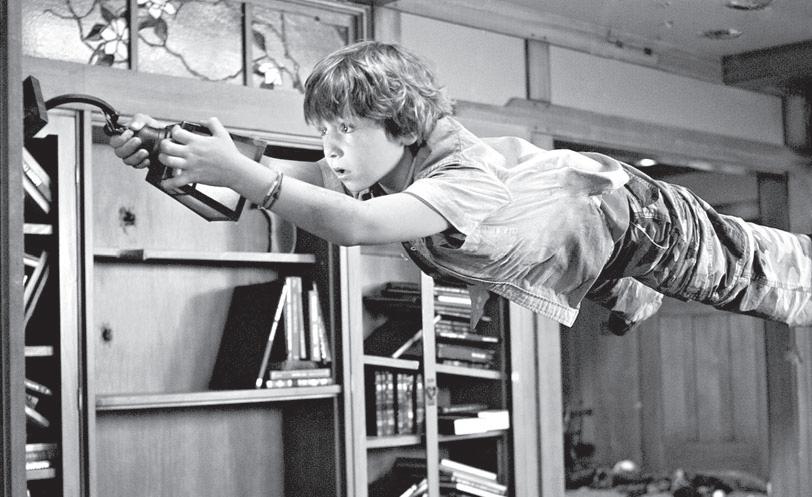
action violence, child peril, some scary images and minimal crude language. The USCCB Office for Film & Broadcasting classification is A-II - adults and adolescents.
Sweetly told modern-day fairy tale about two 13-year-old best friends - Claire (Emma Roberts)
rational creatures. Our appetites are not the only things which hunger - we also have an intellect which hungers. So when young people’s minds are ‘fed’, as this book is certain to do, their appreciation for the truth of Christ’s teachings will provide them with no shortage of awe and wonder.
Many have often asked questions such as, “How does the Church remain relevant in a day and age saturated in pornography, lust and sexual promiscuity?”
Knowing that Pope John Paul II has the answer, Fr Percy helps us to see that the best way to remain relevant is to actually harness the topic of sexuality - to speak about it candidly - but not only as we see it, but how God sees it. Such a perspective is mesmerising and breathtaking.
There is no doubt that the hot topic of sex and all of the controversial issues associated with it has distanced many people (Catholics and non-Catholics alike) from Christ and his Church ever since the sexual revolution began in the 1960’s. But by increasing society’s interest in sex, such a revolution will in the end serve to bring many people closer to God. Fr Percy’s book will help facilitate this shift as it enables the reader to see just how much meaning and purpose God has ascribed to our sexuality, the human body, and our tremendous capacity for relationships.
I can also see that this book will be of great help for another reason: young people are marrying at a later age today. Many are getting married in their thirties rather than their twenties. This has made it difficult for many young people to live chaste lives because they have to wait much longer to marry. Moreover, many young people are saying things such as, “And as if that does
not make it difficult enough, living in a society which often views the virtue of chastity as so unrealistic and unfashionable does not exactly make it any easier either.” By giving them reasons to see why we do well to strive for the virtue of chastity – this book will not only help them to aspire all the more to grow in this virtue – in the meantime, as they keep looking for a suitable spouse they will see that their single status is not without meaning or purpose.
What also makes Fr Percy’s book of great merit is his holistic approach: he states that there are many books written on the body from the point of view of health, biology, physics, chemistry and even economics, but that insofar as ignorance of the body from God’s point of view prevails, our understanding of ourselves and the meaningful purpose with which we are made will be incomplete.
If the reader is one - who in his or her desire to seek completeness, has stumbled on the way and is struggling and suffering because of their failures - the last chapter contains heartening words on the immeasurable goodness of God’s forgiveness and the solid grounds we have to trust in Christ and his Church.
Further to the reasons mentioned above I thoroughly recommend Fr Percy’s book for anyone who wishes to find ways of communicating the richness of Pope John Paul II’s Theology of the Body to others in a clear and concise way. I am sure it will be a great evangelical resource for many years to come.
Fr Michael de Stoop is a Catholic Youth Services Chaplain, Sydney.
Review: courtesy of The Catholic Weekly, Sydney
NOTE: Theology of the Body
Made Simple is available NOW from The Record. $16 plus $1.50 postage

and Hailey (Joanna “JoJo” Levesque) - who help a mermaid (Sara Paxton), washed ashore during a storm, experience true love in the hopes that the magic wish rewarded them will undo Hailey’s impending move to Australia. A delightful mix of fantasy, comedy and romance, director Elizabeth
Allen’s wholesome and warmly sentimental effort scores points for admirably showing that authentic love can express itself in varied ways. Some mild sensuality and suggestiveness, a few crass expressions and innuendo.
The USCCB classification is AII - adults and adolescents. - CNS
■ SPECIALIST
Bookkeeper specialising in troubleshooting, MYOB and Quickbook, preparation of BAS and books to balance sheets. Ph: 9375 9620.
■ BRICK REPOINTING
Phone Nigel 9242 2952.
■ PERROTT PAINTING PTY LTD
For all your residential, commercial painting requirements. Phone Tom Perrott 9444 1200.
■ PICASSO PAINTING
Top service. Phone 9345 0557, fax 9345 0505.
■ RETAILER OF CATHOLIC PRODUCTS Specialising in gifts, cards and apparel for baptism, communion and confirmation. Ph: 9456 1777. Shop 12, 64-66 Bannister Road, Canning Vale. Open Mon-Sat.
■ WORK FROM HOME
Around your children & family commitments. My business is expanding and I need people to open new areas all over Australia. Training given. Highly lucrative. www.cyber-success-4u.org
■ ALL AREAS
Mike Murphy 0416 226 434.
■ LEARN GREGORIAN CHANT Gregorian Chant for Beginners: Notation, vocal
technique, English modal chants, Latin chants. 11wk course on Mondays starting 13 March. The only pre-requisite is a willingness to sing. Jubilus Song School Australia. Making sacred music simple. Phone: 1300 725 138.
■ DENMARK
Holiday House 3bdr x 2bath, sleeps up to 8. BOOK
NOW. Ph: Maria 0412 083 377.
■ SHOALWATER
Holiday units, self-contained, sleep up to 6, walk to the beach, near Penguin Island, very affordable rates. Bookings Ph: 0414 204 638 or bluewaterhol idayunits@dodo.com.au.
■ REPAIR YOUR LITURGICAL BOOKS
Tydewi Bindery offer handcrafted fine bindings, journals, leather recovering. Repairs fo all your books, liturgical, bibles, missals and statues. Ph. 9293 3092.
■ WA CATHOLIC TENNIS ASSOCIATION
Invites you to join in the forthcoming season on Saturday afternoons from May to September at the Manning Tennis Club. Anyone aged 17-70 is welcome to fill our A, B and C grades. Just form a group of 5 people (three men, two women) for our doubles competition. Come along, improve your tennis while having great fun and meeting new people. Ph: Warren 9271 4670, Rod: 0409 839 768.THANK YOU
■ THANKS TO THE SACRED HEART
The Miraculous Infant Jesus, The Holy Spirit, Our Blessed Lady, St Joseph, St Anthony and St Jude, for the recovery of our son from major surgery. R&CM.
Sunday, March 19
Eternal Word Television Network: 1 - 2 pm on Access 31 St Joseph, Guardian of the Redeemer [EWTN Gallery]
The Rosary Christian Tutorial Association regrets that, due to a broadcasting problem, the sound was very faulty in the important interview of Cardinal Pell last Sunday. We plan to require that this program be rebroadcast, and will advertise the time when known. Postal address: RCTA, PO Box 1270, Booragoon 6954. Enquiries 9330-1170.
Sunday March 19
MEDITATIVE TAIZE STYLE PRAYER
7pm-8pm Come and join in the Meditative Prayer in the beautiful candle lit chapel Chanting the Taize Mantras and time for silent prayer - 16 York St, South Perth. Enq: Sister Maree Riddler 94573371
Tuesday March 21
MONICA AND AUGUSTINE GROUP
Following the overwhelming response to the first prayer and reflection session, the Monica and Augustine group will meet for prayer and sharing at St Thomas the Apostle parish hall, 2 College Road, Claremont at 7.30pm. Representatives from at least 6 parishes attended the first session, In addition to times of prayer and reflection, there will also be time for some small group sharing of personal stories and situations. Once again, the emphasis will not be on blaming, but to follow St Monica’s example of prayer and good works and never giving up. All are welcome to stay for a cuppa at the conclusion. For futher details or RSVP contact Fr Brian O’Loughlin 9384 0598 or email claremont@perthcatholic.org. au.
March 24-25
THE HOLY SPIRIT OF FREEDOM COMMUNITY CHARISMATIC RETREAT
“The truth will set you free.” John 8:32. St Anne’s Parish Hall, 11 Hehir St, Belmont. Rally - Fri 24th March – 7 pm to 9.30 pm. Retreat Day - Sat 25th March – 10 am to 6 pm. All are welcome to join in the Friday evening rally and on the Saturday, times of praise & worship, sharing, talks and prayer including a Charismatic Mass at 4.30pm. After Mass there will be a sausage sizzle & salad provided during a time of fellowship. Tea & coffee provided. BYO sandwich lunch to share. For further details contact Glenn on 9228 1800.
Saturday March 25
THE DAY OF THE UNBORN CHILD
Mass and Holy Hour at St Mary’s Cathedral, Perth on the Feast of the Annunciation Led by Archbishop Hickey The Day of the Unborn Child is a commemoration of the day that Our Lord Jesus Christ was conceived in the womb of His Holy Mother. Thus, this day is
celebrated on March 25, the Feast of the Annunciation. We celebrate the sacredness of every human life and the blessings of motherhood. On behalf of all pro-lifers, we congratulate and thank mothers who love and nurture their unborn children, and we commend the fathers who love and protect both mother and child. We pray especially for those families who so generously defend life under difficult circumstances. For men and women, whose children have been killed by abortion, we offer hope and healing and the assurance of God’s infinite mercy. Please try to attend and tell your friends and family – Children most welcome. Time: 10am to noon.
Saturday March 25
NOVENA TO OUR LADY
The monthly Novena to Our Lady of Good Health will be held at the Holy Trinity Church, 8 Burnett St, Embleton at 5pm followed by the Vigil Mass at 6pm.
Saturday March 25
TALKS AT JOHN XXIII
“A Morning Retreat Discernment y”
Presenter : Murray Graham (Inner Peace (MEd) (Centre Director) Mackillop Room (Multi-Purpose Room) John XXIII College.
Cost: Donation for Inigo. 9am-12.30pm . Details: Murray 9383 0444.
Sunday March 26
LEGION OF MARY
Comitium of Perth extend to all Legionaries, Active and Auxiliary, an invitation to attend their ACIES which will be held at St Mary’s Cathedral Perth, commencing at 3pm. This is the annual occasion on which we recommit ourselves to our Blessed Mother. All are encouraged to attend. contact details Rosemary Bennett: Ph 9454 7831 (Secretary).
Sunday March 26
ALPHA
COME & SEE! All welcome to a brand new Alpha Course starting with free Welcome Dinner and loads of fun, faith and friendship. Venue is St Johns, 16 Aberdeen St, Northbridge and time is 5.30pm. More info: Harry (9444-4626)
Sunday March 26
PILGRIMAGE TO BULLSBROOK SHRINE
The next end of month pilgrimage to the Shrine of Virgin of the Revelation takes place on Sunday, March 26, commencing at 2pm. Prior to the celebration of Procession, Rosary and Mass, Reconciliation will be available in Italian and English. All are most welcome. Enquiries SACRI 9447 3292.
Thursday March 30
MOTHERS’ PRAYER MASS
For all Mothers and Grandmothers coming together to pray for their children. Fathers, Grandfathers welcome. This is
a wonderful and necessary opportunity for God to hear and act upon the hearts and minds of mothers joining together as one here on earth. (Enjoy fellowship following the Mass over a cup of tea or coffee) here at the Catholic Pastoral Centre, 40a Mary Street, Highgate at 10am. For information regarding the Mass (if required) please contact Veronica Peake on 9447 0671.
Friday March 31
HEALING FIRE BURNING LOVE
This Lent break down walls and receive God’s love and mercy. Our Lady of the Missions Catholic Church Whitfords, 270 Camberwarra Drive, Craigie. Friday 7.30pm - 9.00pm Daniel Garlett, from the Aboriginal Catholic Ministry, will express the love of Jesus sacrifice in his talk on reconciliation and unity. Daniel uses the Didgeridoo in praise and worship to express the love and unity of God’s Spirit with his people. Come and experience the fire of God’s love through praise and worship and healing prayer in the presence of the Blessed Sacrament. For more information please contact Jenni Young 0404 389 679.
Saturday April 1 DAY WITH MARY
St Joseph’s Church, 19 Hamilton St, Bassendean. 9am - 5pm, A video on Fatima will be shown at 9am. A day of prayer and instruction based upon the messages of Fatima. Includes Sacrament of Penance, Holy Mass, Eucharistic Adoration, Sermons, Rosaries, Procession of the Blessed Sacrament and Stations of the Cross. Please BYO. enq: Franciscan sisters of the Immaculate 9250 8286.
Sunday May 7
THE BOVE FARM MAY ROSARY RALLY
Celebration in Honour of Our Lady to be held at the Queen of the Holy Rosary Grotto, Bove’s Farm, Roy Road, Jindong. Hymn singing commences at 12.30pm. Holy concelebrated Mass led by Bishop Gerard Holohan commences 1pm, followed by Rosary Procession and Benediction. Afternoon tea provided. All welcome! Bus bookings from Perth to Bove Farm can be made with Francis Williams on ph 9459 3873 or mob 0404 893 977. (Note: Roy Road runs off the Bussell Highway, halfway between Busselton and Margaret River).
Every Saturday
ART EXHIBITION
Art exhibition every Saturday at the Parish Hall, Star of the Sea church, Cottesloe, cnr of Stirling Highway and McNeil Sts beginning Saturday March 4, 10am – 4pm. All proceeds from the sale towards the extension of St Mary’s Cathedral, Perth.
ALCOHOLICS ANONYMOUS
Is alcohol costing you more than just money? Alcoholics Anonymous can help. Ring 9325 3566.
BLESSED SACRAMENT ADORATION
Holy Family Church, Alcock Street, Maddington. Every Friday 8.30 am Holy Mass followed by Blessed Sacrament Adoration till 12 noon. Every first Friday of the month, anointing of the sick during Mass. Enq. 9398 6350.
PERPETUAL ADORATION AT ST BERNA DETTE’S
Adoration: Chapel open all day and all night. All welcome, 49 Jugan St, Glendalough, just north of the city. Masses every night at 5.45pm Monday to Friday, 6.30pm, Saturday and the last Sunday Mass in Perth is at 7pm.
ST CLARE’S SCHOOL, SISTERS OF THE GOOD SHEPHERD
A short history of St Clare’s School is being prepared to celebrate 50 years of its work in WA. Any past students, staff, families or others associated with the school - from its time at Leederville, at North Perth, at East Perth or at Wembley - are invited to contact us with photographs, or memories. Privacy will be protected, in accordance with your wishes. Please contact Nancy Paterson on 0417 927 126, (email npaters@yahoo.com.au) or St Clare’s School, PO Box 21 & 23 Carlisle North 6161. Tel: 9470 5711.
Wednesdays
SIGN LANGUAGE COURSE
Australian Sign Language (Auslan)
Classes are offered free of charge at Emmanuel Centre on Wednesdays at 1pm. If this does not suit you, other arrangements can be made. Please contact Fr Paul or Barbara at Emmanuel Centre, 25 Windsor St Perth 9328 8113.
Wednesday During Lent SHARED MEALS
In preparation for the Easter Celebration, we are holding two more Shared Meals with a Topical Talking Point. The Venue St Kieran’s Parish Centre, Corner of Cape and Tyler Streets, Tuart Hill. The Time will be 6.30pm. The dates are: March , 22 and 29. The topical talking point about “Life after death” will be held on Wednesday March 29 - a fascinating and scientific documentary by the BBC. According to this documentary, “Life after Death” is just as certain as death itself. Don’t miss out! Please, put these dates in your diary and make every effort to attend. All you need to bring with you is a plate with food to share with others. Obviously, these discussions are meant for ADULTS ONLY. It’s not a PICNIC! I look forward to having good attendance. All welcome! Enquiries: Fr Michael Gatt on 9444 1334.
PERPETUAL ADORATION AT ST BERNADETTE’S Adoration: Chapel open all day and all night. All welcome, 49 Jugan St, Glendalough, just north of the city. Masses every night at 5.45pm Monday to Friday, 6.30pm, Saturday and the last Sunday Mass in Perth is at 7pm.
ST CLARE’S SCHOOL, SISTERS OF THE GOOD SHEPHERD
A short history of St Clare’s School is being prepared to celebrate 50 years of its work in WA. Any past students, staff, families or others associated with the school - from its time at Leederville, at North Perth, at East Perth or at Wembley - are invited to contact us with photographs, or memories. Privacy will be protected, in accordance with your wishes. Please contact Nancy Paterson on 0417 927 126, (email npaters@yahoo.com.au) or St Clare’s School, PO Box 21 & 23 Carlisle North 6161. Tel: 9470 5711.
Please Note
The Record reserves the right to decline or modify any advertisment it considers improper or not in unison with the general display of the paper.
Fathers in Families, the policy document currently being serialised in The Record, aims at supporting all dads without distinction to fulfil their role as effective fathers
Fatherlessness is a growing problem in Australia and the Western world. Whether caused by divorce and broken families, or by deliberate single parenting, uninvolved or uncommitted fathering, more and more children grow up without fathers. Indeed, 85 per cent of single parent families are fatherless families. Father absence has been shown to be a major disadvantage to the wellbeing of children. The following is a summary of the evidence for the importance of fathers and the need for traditional two-parent families.
One expert from Harvard medical school who has studied over 40 years of research on the question of parental absence and children’s well-being said this: “What has been shown over and over again to contribute most to the emotional development of the child is a close, warm, sustained and continuous relationship with both parents.”1 Or as David Blankenhorn has stated in Father-less America: “Fatherlessness is the most harmful demographic trend of this generation.”2
Another expert puts it this way: “There exists today no greater single threat to the long-term wellbeing of children, our communities, or our nation than the increasing number of children being raised without a committed, responsible, and loving father.”3
Bryan Rodgers of the Australian National University has recently reexamined the Australian research. Says Rodgers: “Australian studies with adequate samples have shown parental divorce to be a risk factor for a wide range of social and psychological problems in adolescence and adulthood, including poor academic achievement, low self-esteem, psychological distress, delinquency and recidivism, substance use and abuse, sexual precocity, adult criminal offending, depression, and suicidal behaviour.” He concludes: “There is no scientific justification for disregarding the public health significance of marital
dissolution in Australia, especially with respect to mental heath. ) 4
And the importance of fathers is neither a recent nor a merely Western truth. The need and importance of fathers is an historical and universal given. As anthropologist Bronislaw Malinowksi put it, “The most important moral and legal rule concerning the physiological site of kinship is that no child should be brought into the world without a man - and one man at that .... I think that this generalisation amounts to a universal sociological law.” There may be cultural variations, yet “through all the variations there runs the rule that the father is indispensable for the full sociological status of the child as well as of its mother, that the group consisting of a woman and her offspring is sociologically incomplete and illegitimate.” 5
Here then is a sampling of the evidence:
Fatherlessness increases poverty
• In America, among families with dependent children, only 8.3 per cent of married couples were living below the poverty line, compared to 47.1 per cent of femaleheaded households. 6
• In Australia, a recent study of 500 divorcees with children five to eight years after the separation found that four in five divorced mothers were dependent on social security after their marriages dissolved. 7
• Figures from Monash University’s Centre for Population and Urban Research show that family break-up, rather than unemployment, is the main cause of the rise in poverty levels in Australia. 8
• A joint report from AMP Life and Canberra University’s National Centre for Social and Economic Modelling says that divorce leaves both partners worse off economically, but women tend to experience the biggest fall in disposable income.9
Fatherlessness lowers educational performance
• American children from intact families have a 21 per cent chance of dropping out of high school whereas children from broken families have a 46 per cent chance. 10
• American school children who
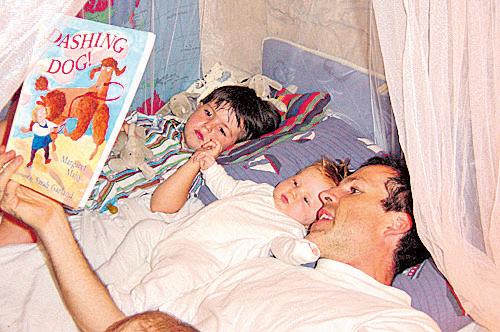
“What has been shown over and over again to contribute most to the emotional development of the child is a close, warm, sustained and continuous relationship with both parents.”
became father-absent early in life generally scored significantly lower on measures of IQ and achievement tests.” 11
• A study of Australian primary school children from three family types (married heterosexual couples, cohabiting heterosexual couples and homosexual couples) found that in every area of educational endeavour (language; mathematics; social studies; sport; class work; sociability and popularity; and attitudes to learning) children from married heterosexual couples performed better than the other two groups. The study concludes with these words: “Married couples seem to offer the best environment for a child’s social and educational development”. 12
• A Melbourne University study of 212 children found that fathers, even more than mothers, had a major beneficial influence on children in their first year of school. The study found that children with regular father involvement were more cooperative and self-reliant in school than children who did not have father involvement. The more regular involvement the father has with the child, the study’s author
said, the better the child does in his or her first year of school. 13
To be continued
1. Armand Nicholi, ‘The Impact of Parental Absence on Childhood Development: An Overview of the Literature.” Journal of Family and Culture, v. 1, n. 3, Autumn 1985.
2. David Blankenhorn, “Fatherless America.” New York: Basic Books, 1995, P. 1.
3. Wade Horn, “Fathers and welfare reform,” Public Interest, no. 129, Fall 1997, pp. 38-49, p. 49.
4. Bryan Rodgers, “Social and Psychological Wellbeing of Children from Divorced Families: Aus- tralian Research Findings,” Australian Psychologist, vol. 31, no. 3, November 1995, pp. 174-182.
5. Bronislaw Malinowksi, “Sex, Culture, and Myth.” New York: Harcourt, Brace & World, 1962, p. 63.
6. U.S. Bureau of the Census, 1991
7. Kate Funder, et. al., “Settling Down - Path- ways of Parents After Divorce.” Melbourne, Austral- ian Institute of Family Studies, 1993.
8. Bob Birrell and Virginia Rapson, “More single parents equals more poverty,” News Weekly, 18 October 1997, p. 8.
9. “Divorce shrinks income,” The Herald Sun, 6 April 2005, p. 29.
10. Sara McLanahan and Gary Sandefur, “Growing up with a Single Parent.” Harvard University Press, 1994.
11. Cited in Nicholas Davidson, “Life Without Father:
America’s Greatest Social Catastrophe.” Policy Review, Winter 1990.
12. Sarantakos, Sotirios, “Children in Three Contexts,” Children Australia, vol. 21, no. 3, 1996, pp. 23-31.
13. Caroline Milburn, “Fathers key to success,” The Age, 5 October 2002, p.11.

Fathers in Families is available from The Record. Tel: (08) 9227 7080.
Cost $5+postage.
For further information on the Fatherhood Foundation Phone (02) 4272 6677 or go to www.fathersonline.org



